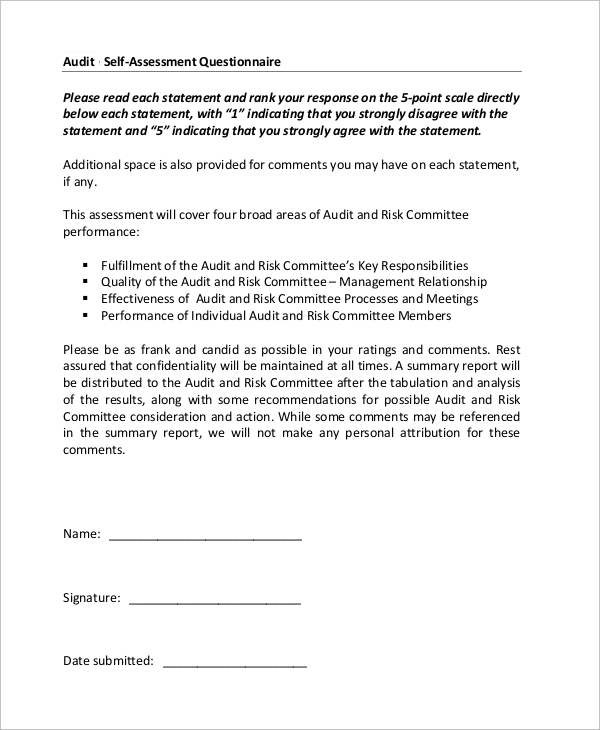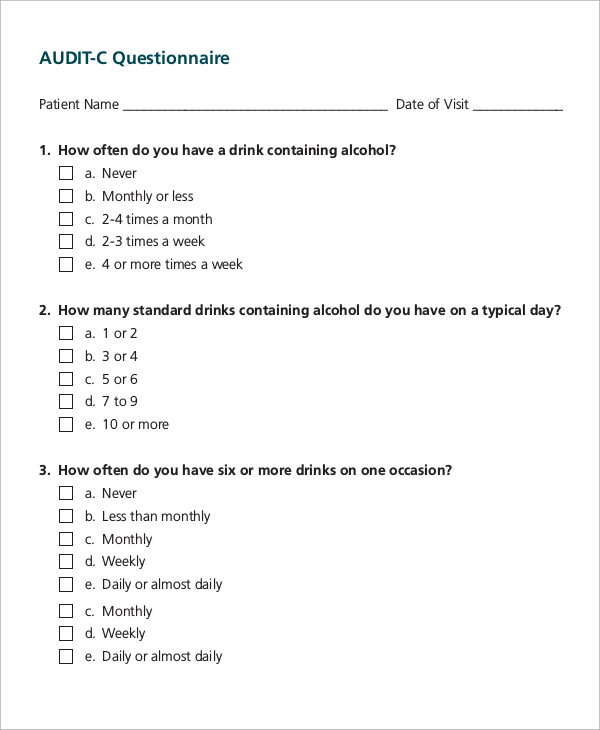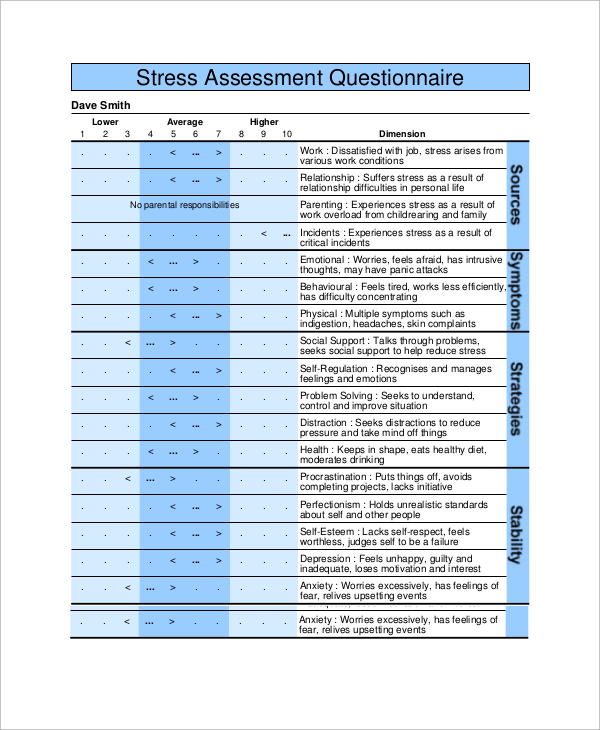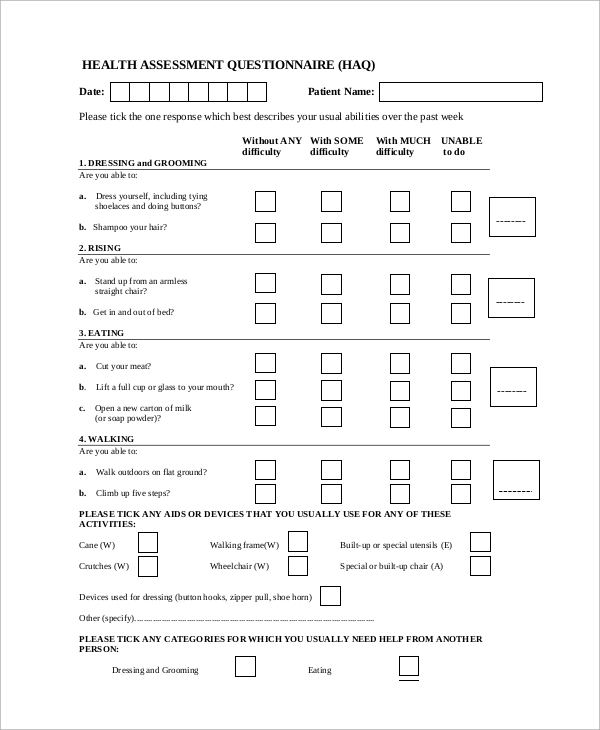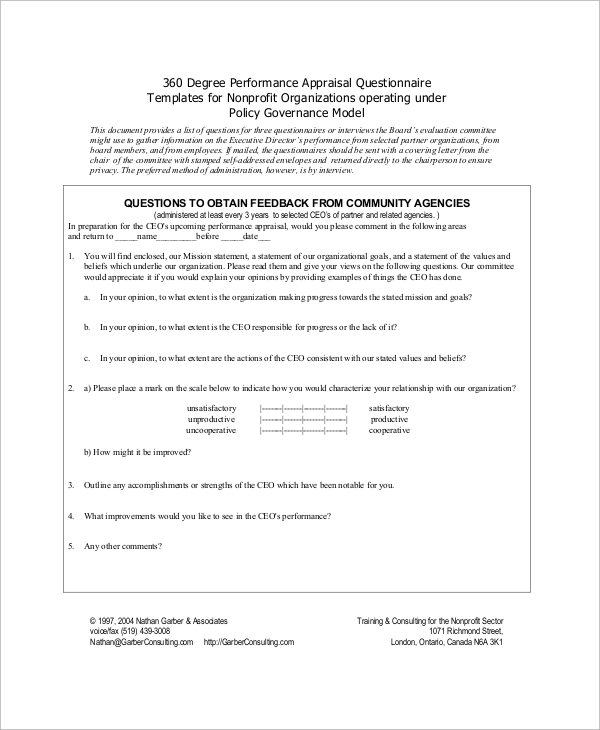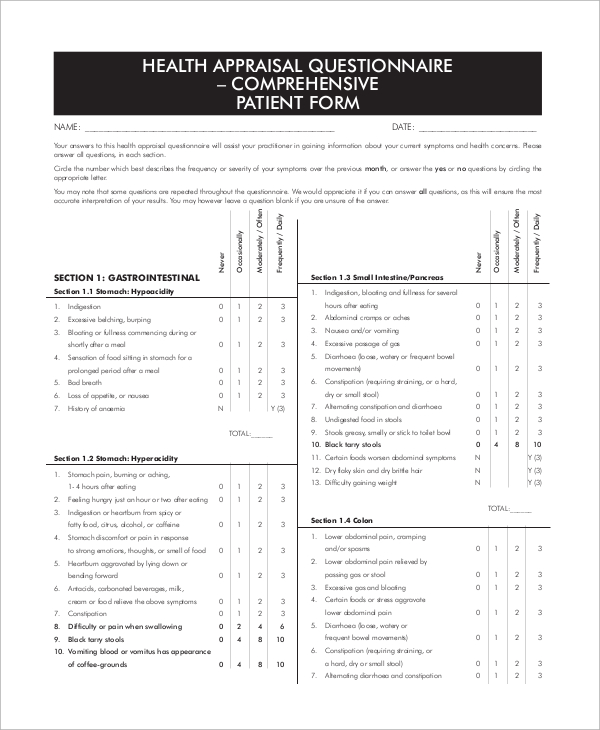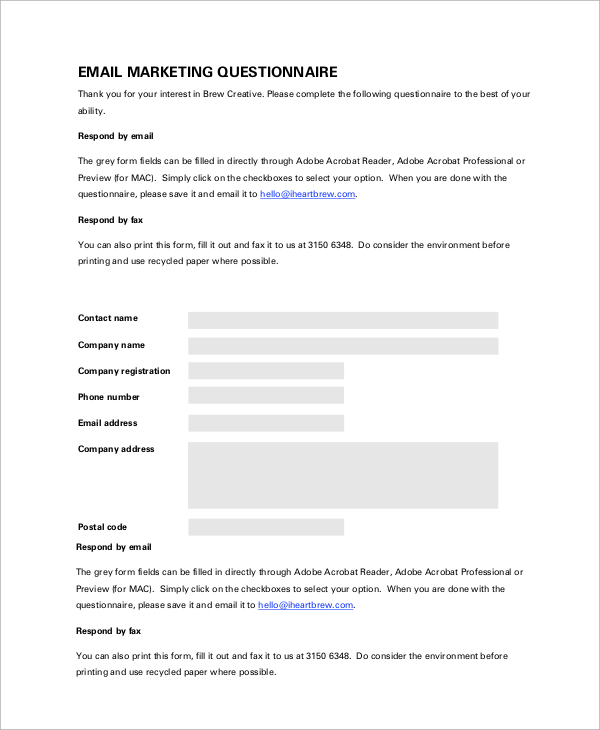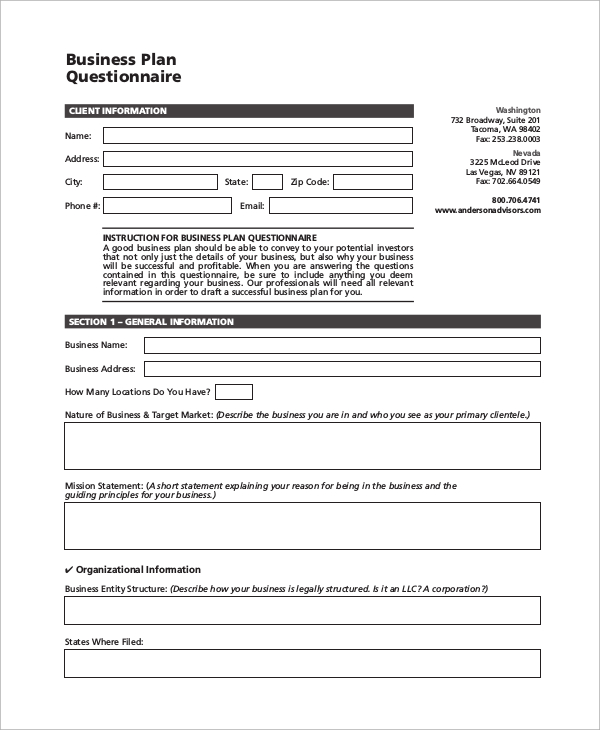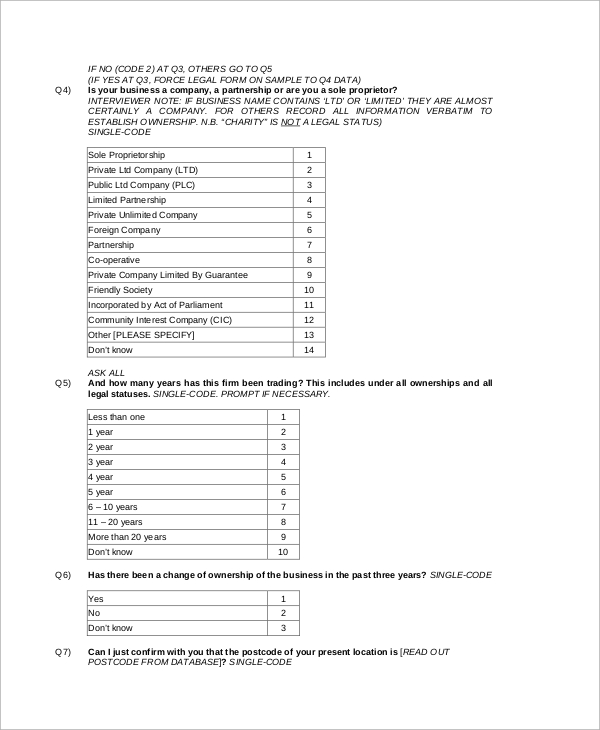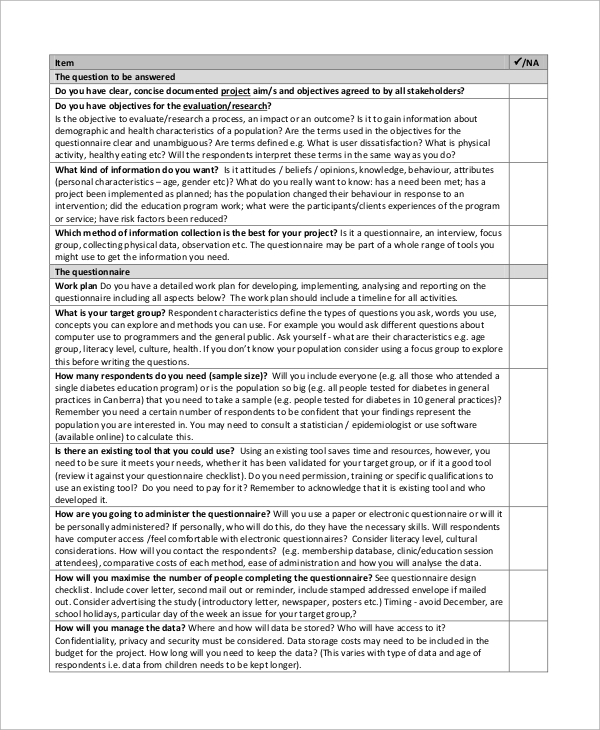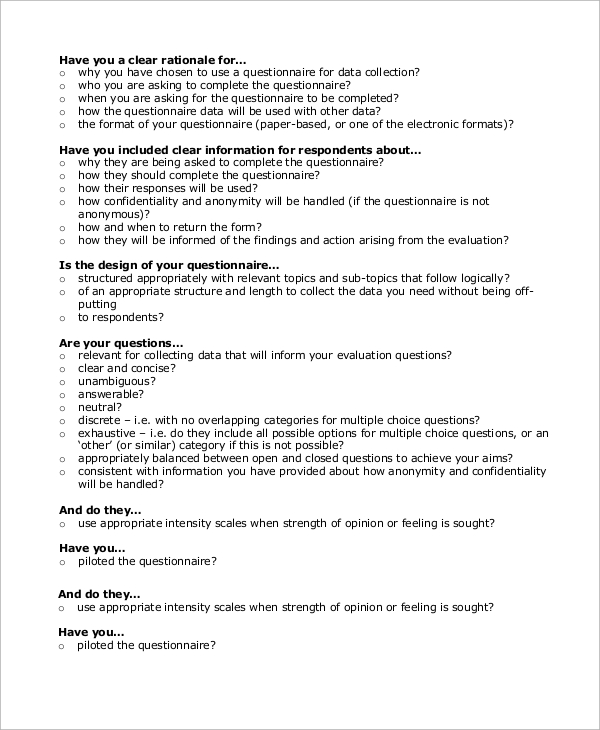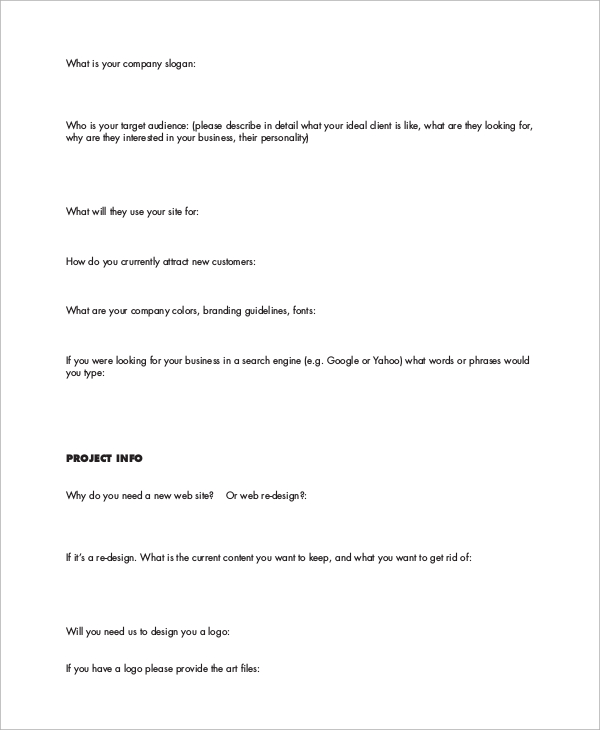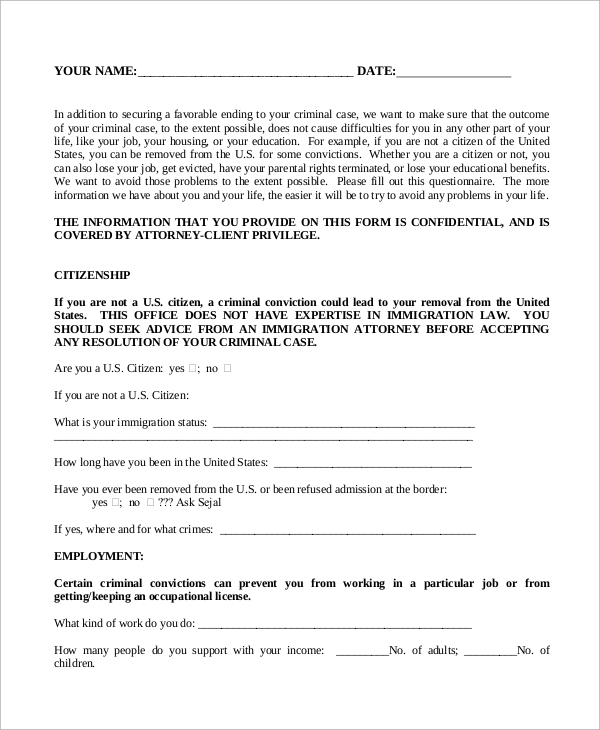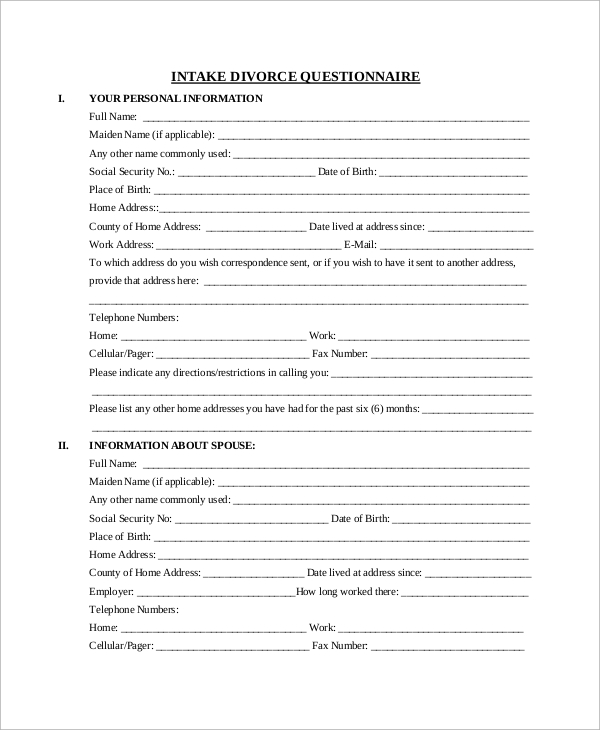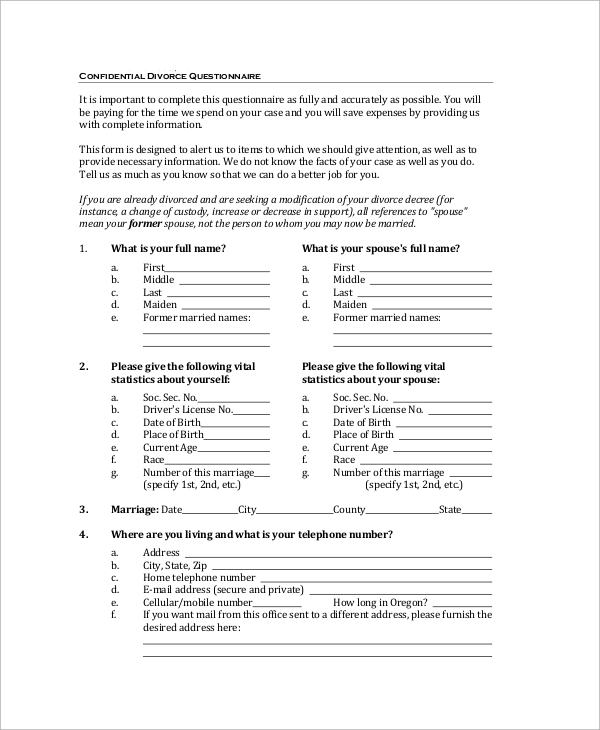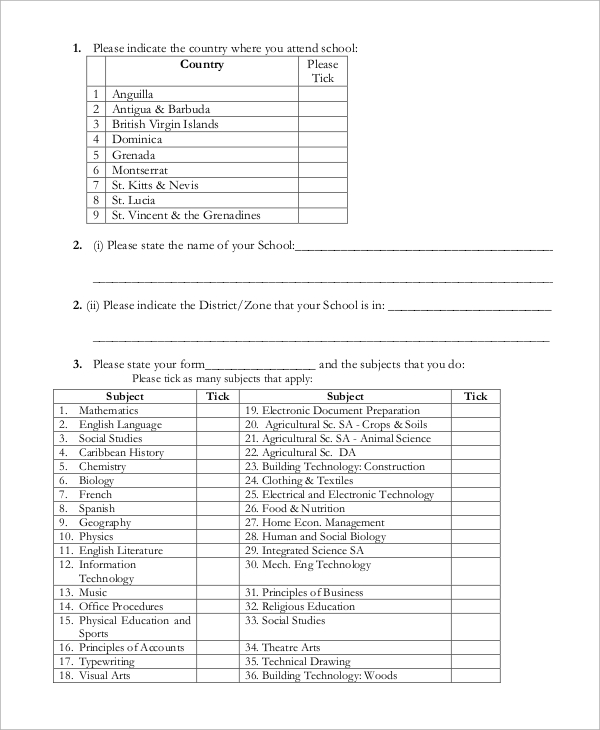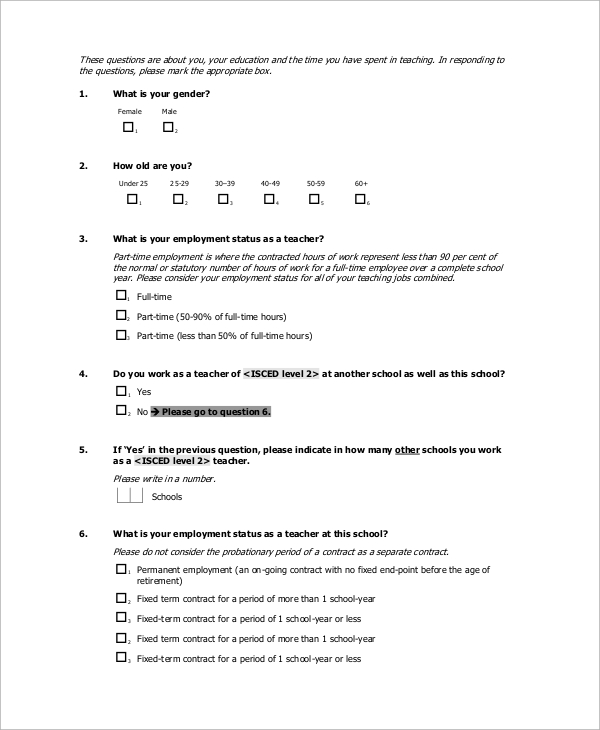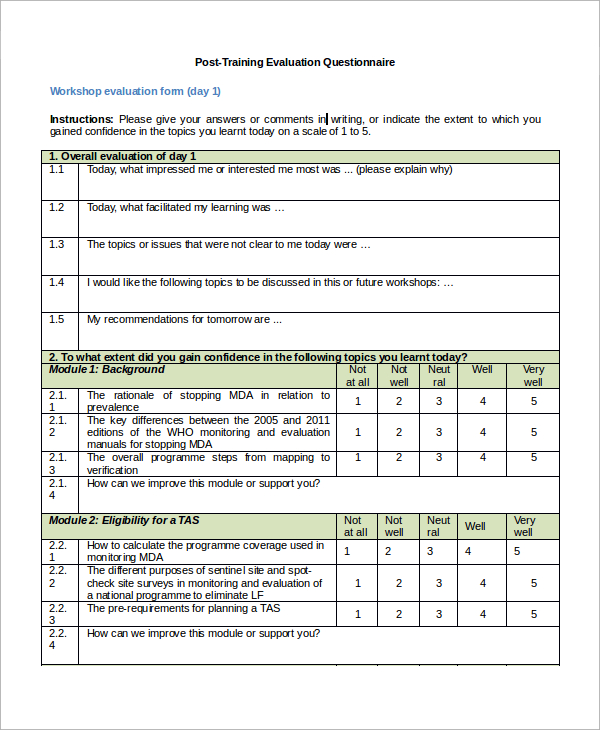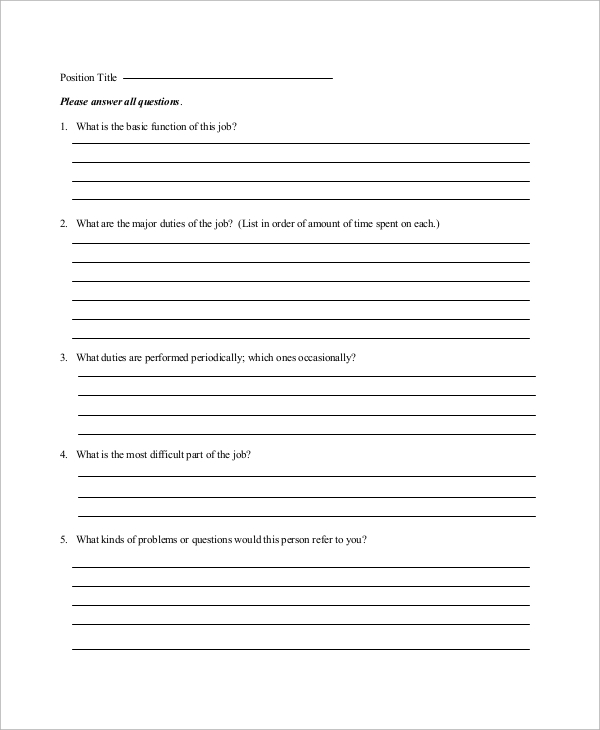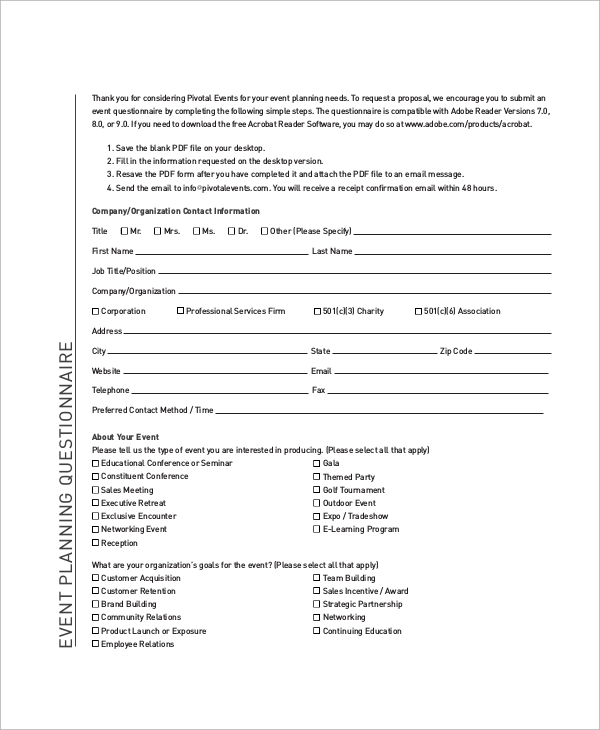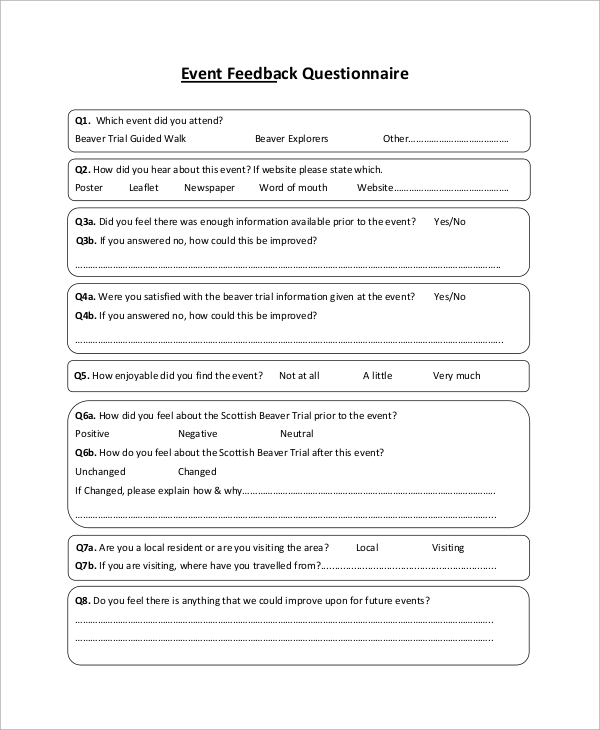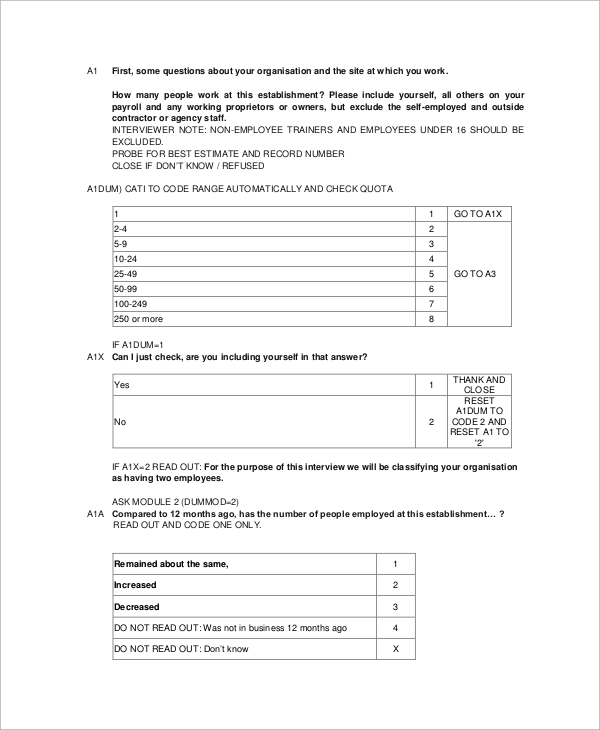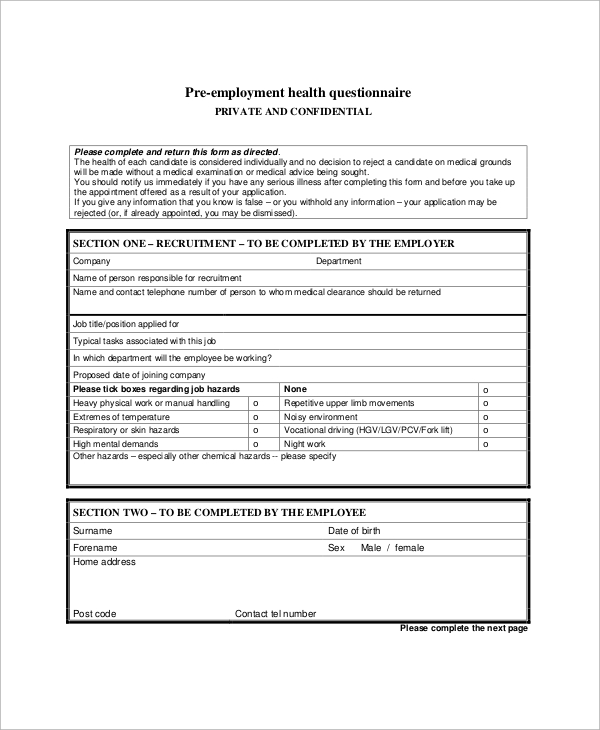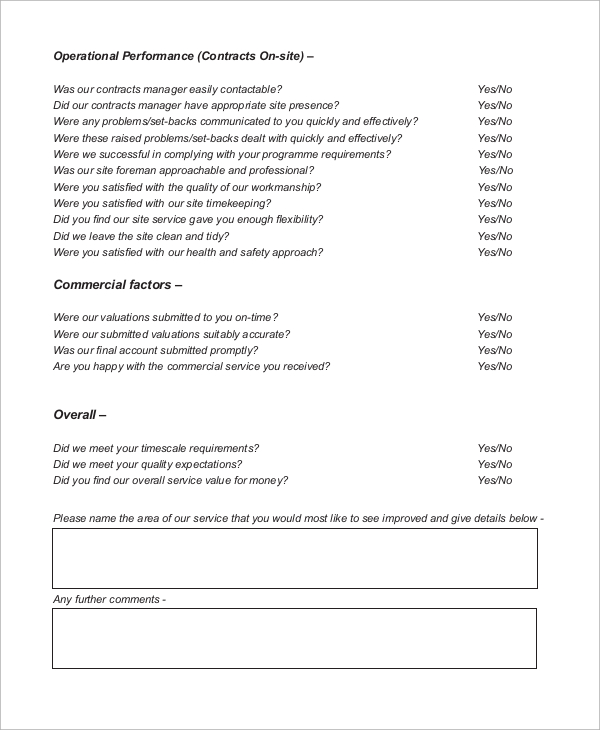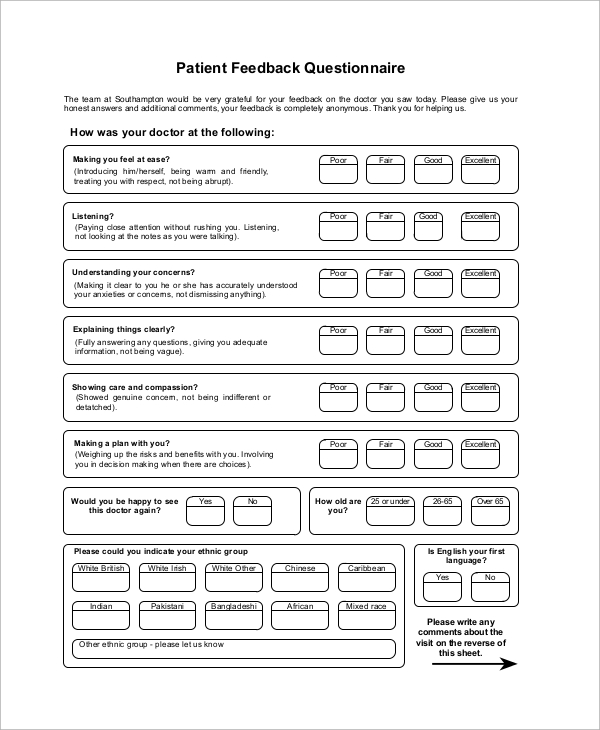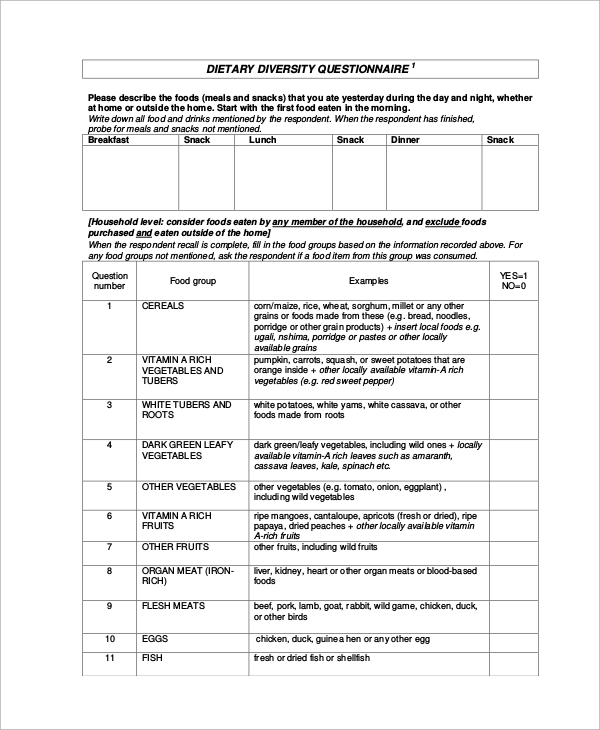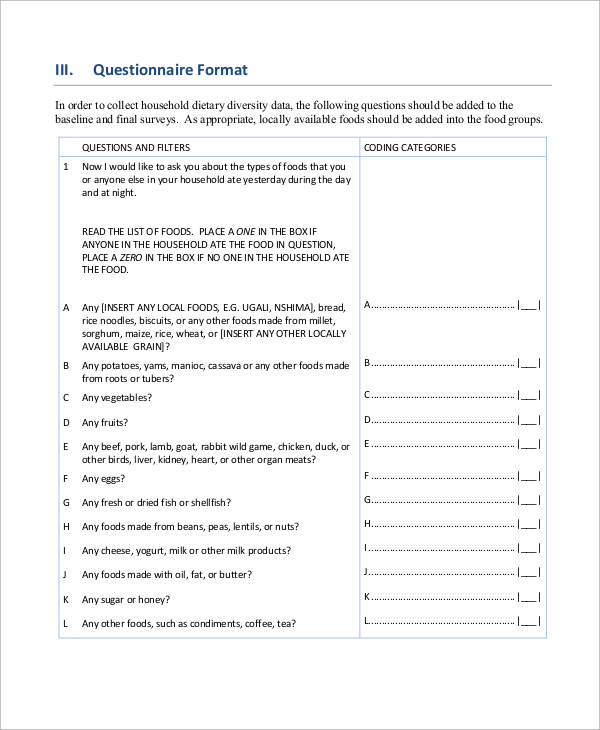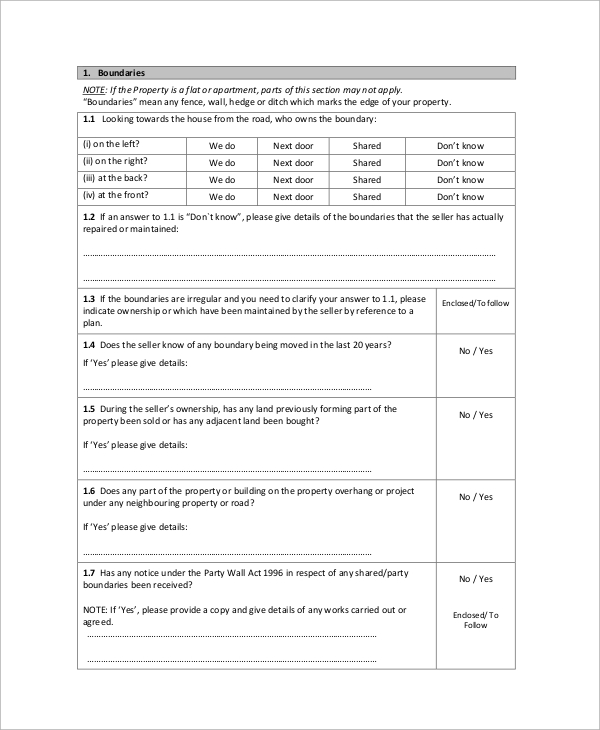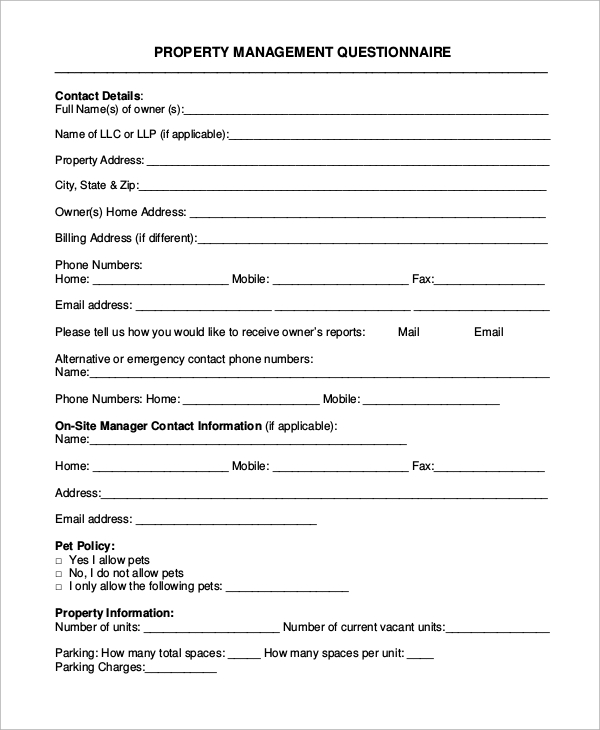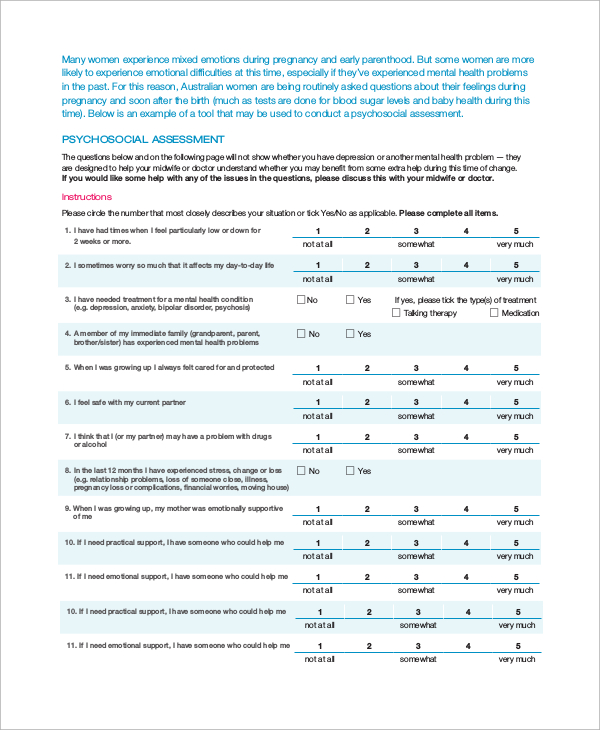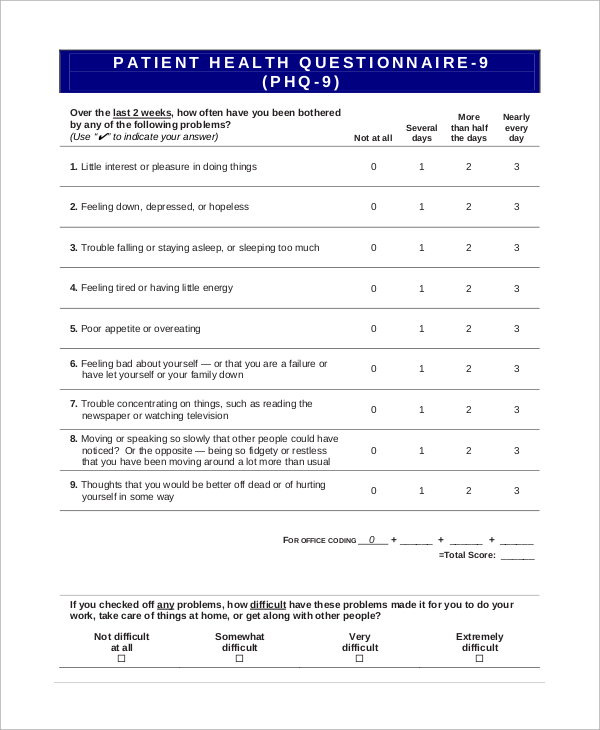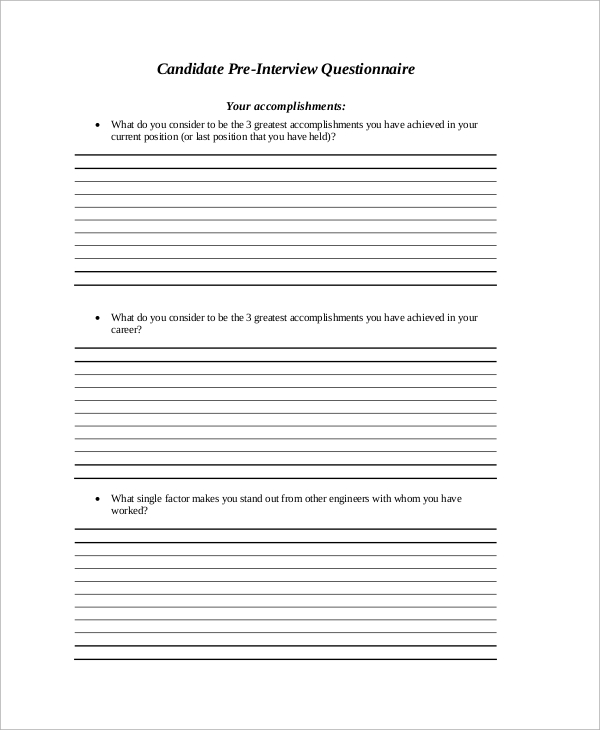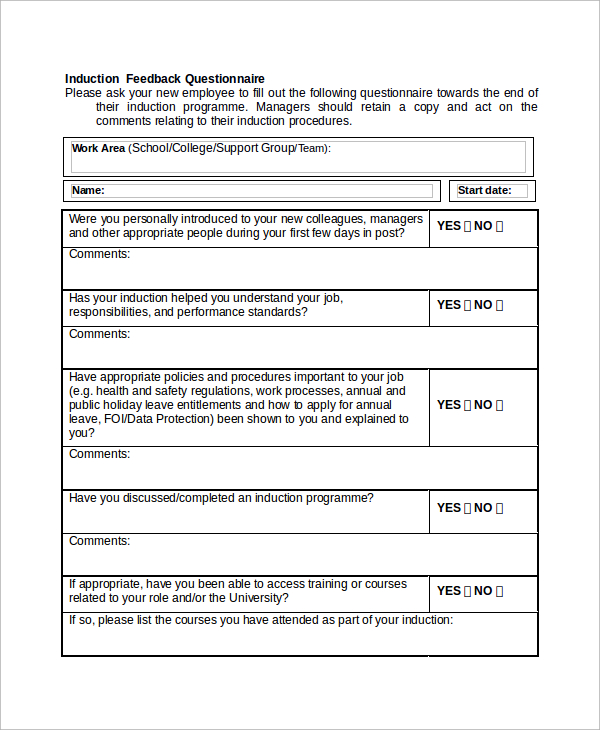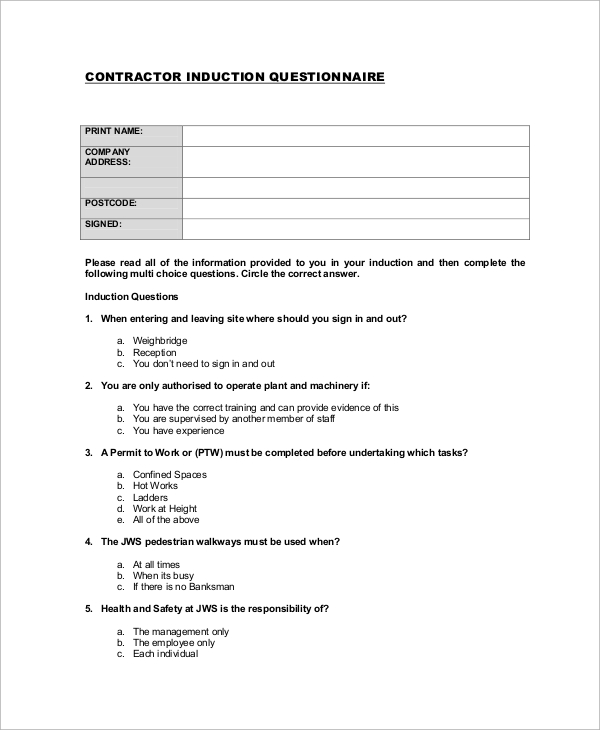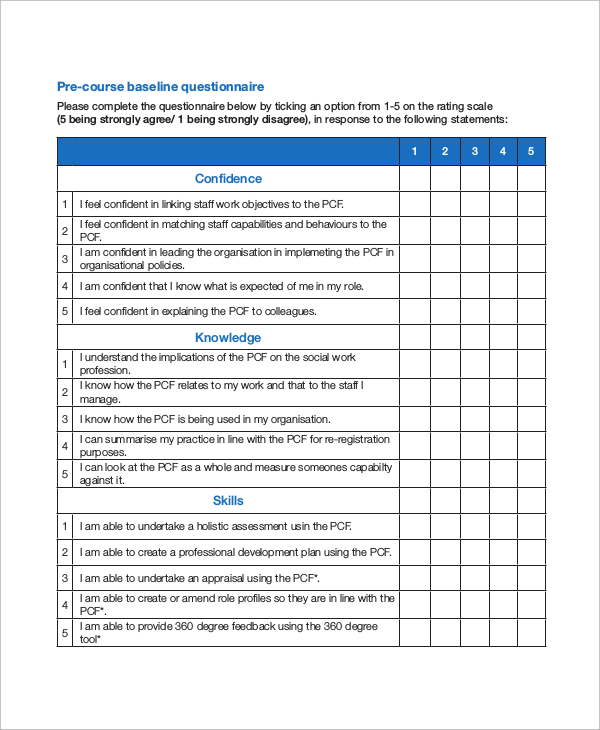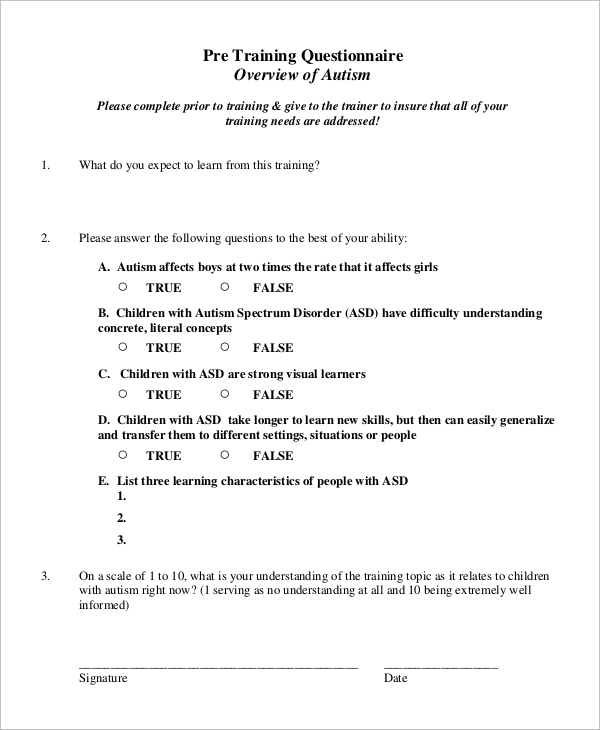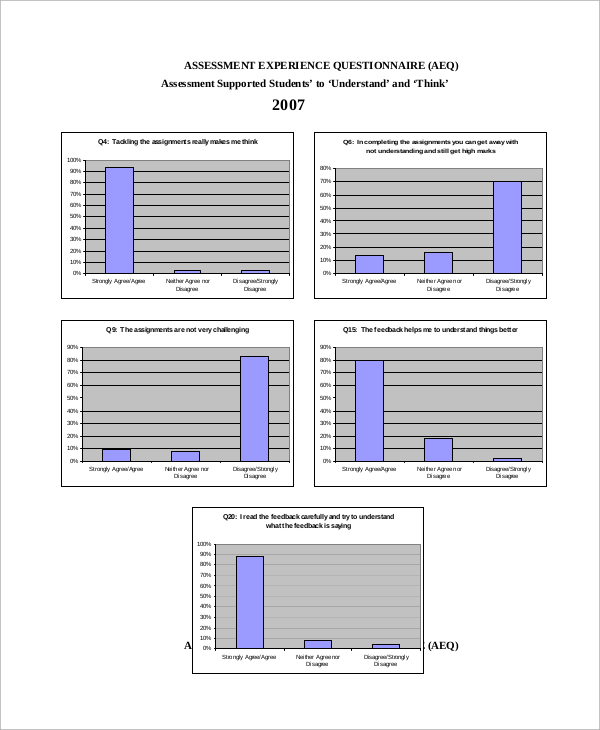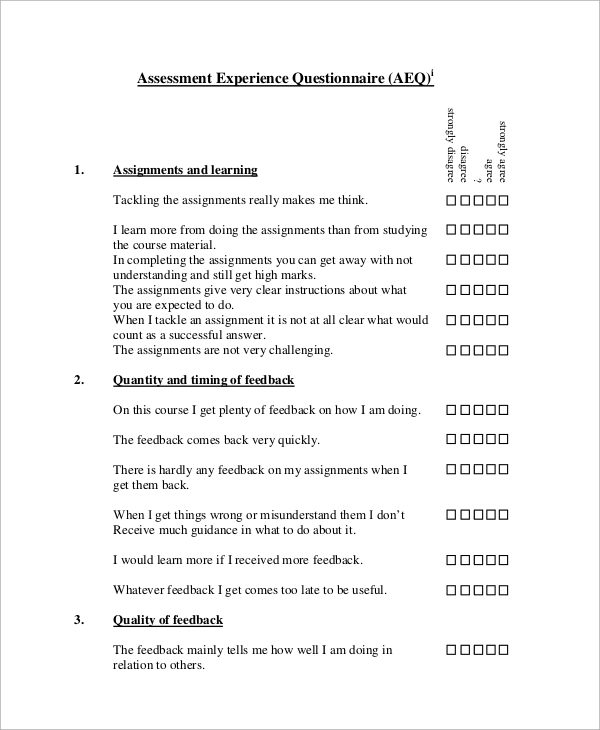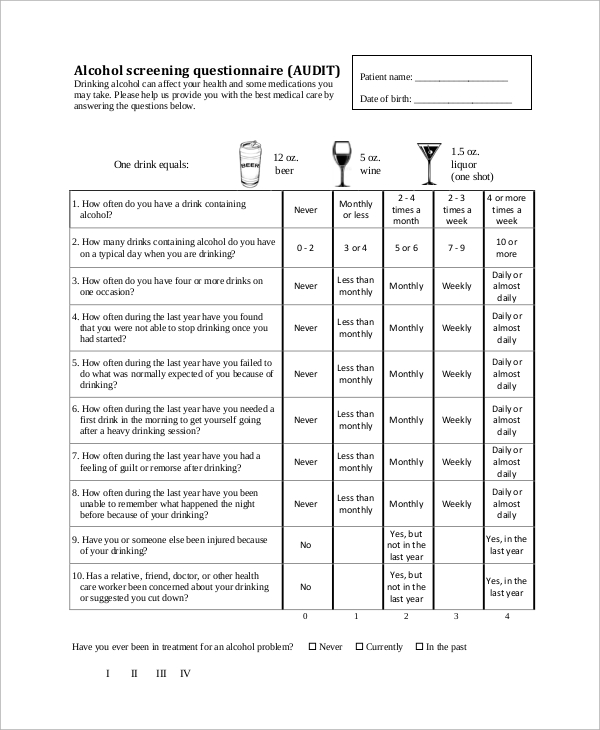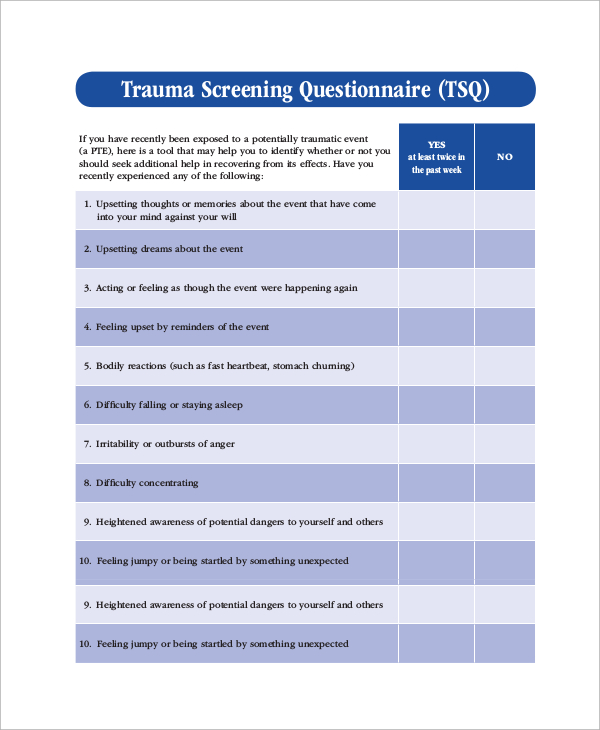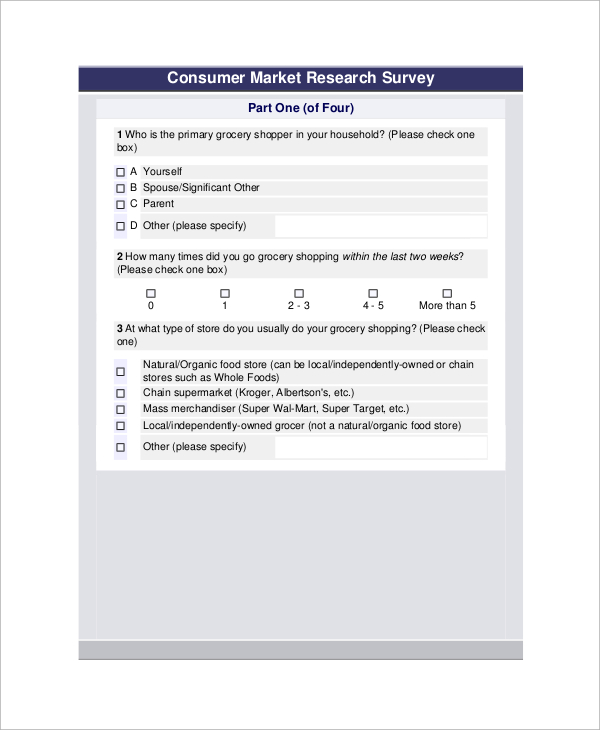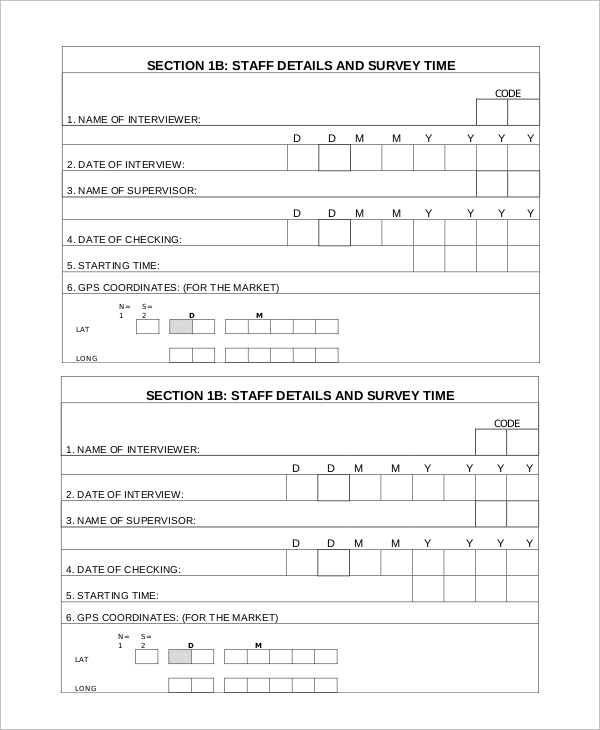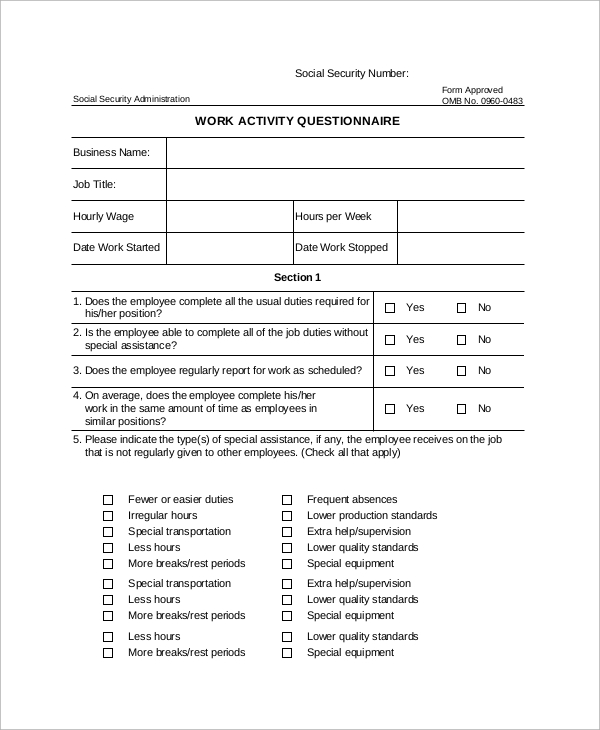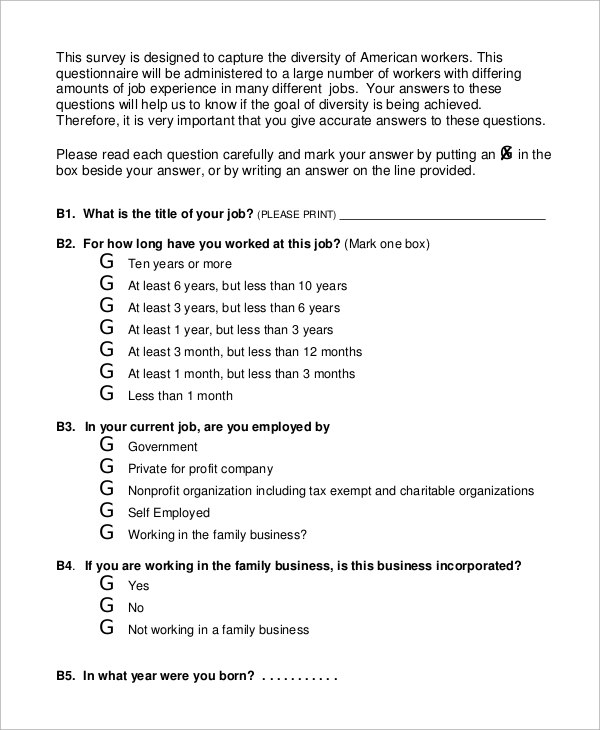A questionnaire is a tool used in research processing. It contains a set of questions along with multiple answer choices. Researchers sample plan effective questionnaires and reach to targeted audience to collect feedbacks. They analyze the feedbacks and turns raw data into valuable information. It helps in better decision making. Do explore a list of sample questionnaire sample documents below. Our samples include questionnaire documents relevant to multiple industries and categories. You may also see survey question templates.
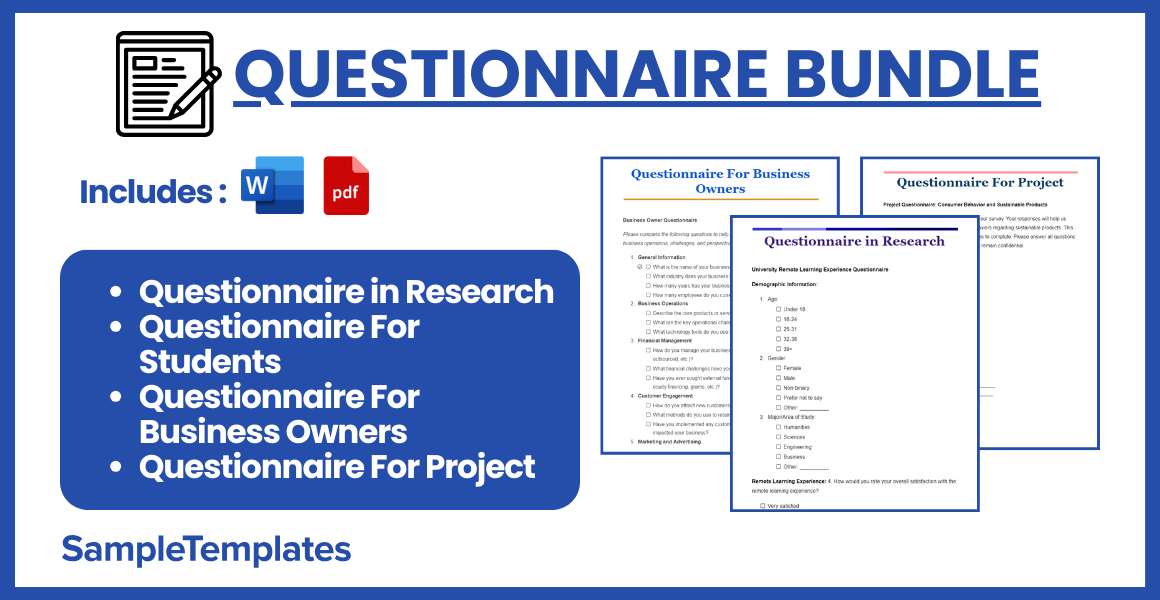
Questionnaire in Research
University Remote Learning Experience Questionnaire
Demographic Information:
- Age:
- Under 18
- 18-24
- 25-31
- 32-38
- 39+
- Gender:
- Female
- Male
- Non-binary
- Prefer not to say
- Other: __________
- Major/Area of Study:
- Humanities
- Sciences
- Engineering
- Business
- Other: __________
Remote Learning Experience: 4. How would you rate your overall satisfaction with the remote learning experience?
- Very satisfied
- Satisfied
- Neutral
- Dissatisfied
- Very dissatisfied
- How often did you attend live remote classes?
- Always
- Often
- Sometimes
- Rarely
- Never
- To what extent do you agree with the following statement: “I had all the technical resources needed to participate in remote learning.”
- Strongly agree
- Agree
- Neutral
- Disagree
- Strongly disagree
- How effective was the communication from your instructors?
- Very effective
- Effective
- Somewhat effective
- Ineffective
- Very ineffective
Impact on Learning: 8. Have your grades improved, worsened, or stayed the same during the period of remote learning?
- Improved
- Worsened
- Stayed the same
- How confident are you in the knowledge and skills acquired during remote learning sessions?
- Very confident
- Confident
- Somewhat confident
- Not confident
- Not at all confident
Open-Ended Questions: 10. What were the major challenges you faced during remote learning?
- What improvements would you suggest to enhance remote learning experiences?
Final Thoughts: 12. Any additional comments or suggestions?
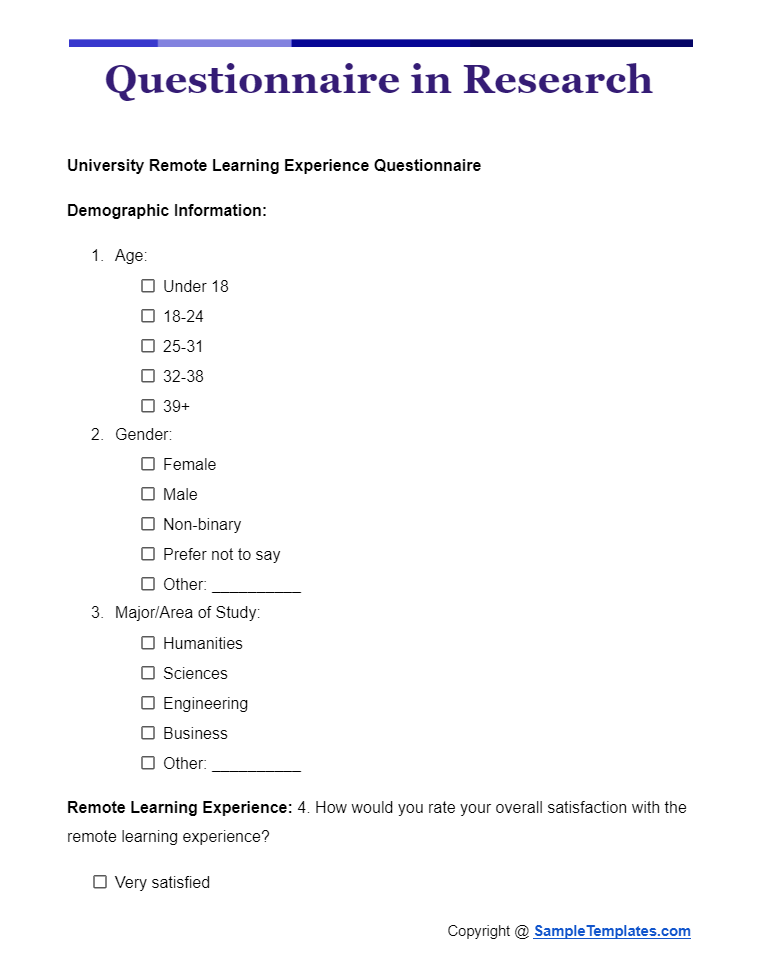
Questionnaire For Students
Student Feedback Questionnaire
Demographics:
- What is your year of study?
- Freshman
- Sophomore
- Junior
- Senior
- Graduate
- What is your major area of study?
Academic Experience: 3. How satisfied are you with the quality of teaching in your courses?
- Very satisfied
- Satisfied
- Neutral
- Unsatisfied
- Very unsatisfied
- How relevant are the courses offered to your intended career path?
- Very relevant
- Somewhat relevant
- Neutral
- Somewhat irrelevant
- Very irrelevant
- How effective is the academic advising provided?
- Very effective
- Effective
- Neutral
- Ineffective
- Very ineffective
Campus Facilities and Services: 6. Rate your satisfaction with the following facilities: (Library, Sports complex, Dining services, Dorm rooms)
- Very satisfied
- Satisfied
- Neutral
- Unsatisfied
- Very unsatisfied
- How would you rate the availability of student support services (counseling, career advice, etc.)?
- Excellent
- Good
- Average
- Poor
- Very Poor
Social Experience: 8. How involved are you in extracurricular activities?
- Very involved
- Somewhat involved
- Not very involved
- Not involved at all
- How would you rate your overall social experience at the university?
- Excellent
- Good
- Average
- Poor
- Very Poor
General Questions: 10. What changes would you like to see on campus to improve student life?
- Do you have any other comments or suggestions for improvement?
Consent: 12. Do you consent to your responses being used for improvement of university services? (Your responses will remain confidential)
- Yes
- No
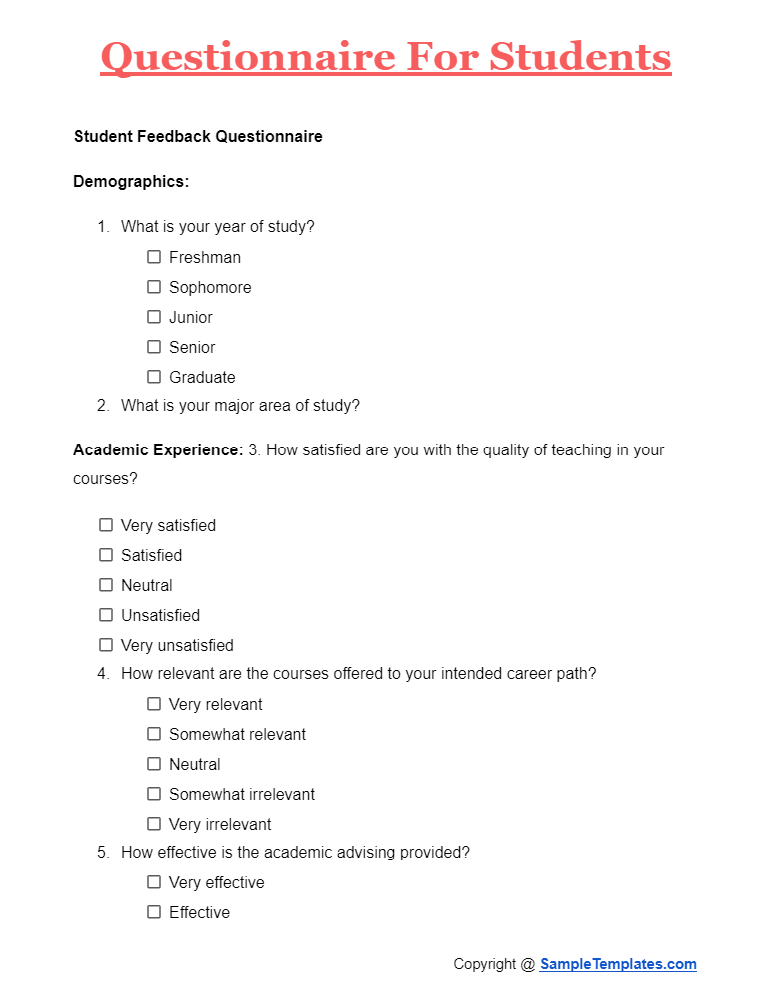
Questionnaire For Business Owners
Business Owner Questionnaire
Please complete the following questions to help us understand more about your business operations, challenges, and perspectives.
- General Information
- What is the name of your business?
- What industry does your business belong to?
- How many years has your business been in operation?
- How many employees do you currently have?
- Business Operations
- Describe the core products or services your business offers.
- What are the key operational challenges you face?
- What technology tools do you use in your daily operations?
- Financial Management
- How do you manage your business finances (in-house, software, outsourced, etc.)?
- What financial challenges have you encountered in the past year?
- Have you ever sought external funding? If so, what type was it (loan, equity financing, grants, etc.)?
- Customer Engagement
- How do you attract new customers?
- What methods do you use to retain customers?
- Have you implemented any customer feedback system? If yes, how has it impacted your business?
- Marketing and Advertising
- What marketing channels have proven most effective for your business?
- How much of your budget is allocated to marketing?
- Have you used digital marketing strategies? If so, which platforms?
- Human Resources
- What are your strategies for hiring and retaining employees?
- How do you handle employee training and development?
- Have you experienced any significant HR challenges?
- Growth and Expansion
- What are your short-term and long-term growth plans?
- Have you considered expanding into new markets or regions?
- What do you see as the biggest obstacle to your business’s growth?
- Industry Trends
- How do you stay updated with trends in your industry?
- What emerging trends do you believe will impact your business the most?
- How does your business adapt to changes within your industry?
- Regulatory Compliance
- What regulatory challenges does your business face?
- How do you ensure compliance with local, state, and federal laws?
- Feedback and Additional Comments
- What is one key area you believe your business could improve in?
- Do you have any other comments or insights you would like to share?
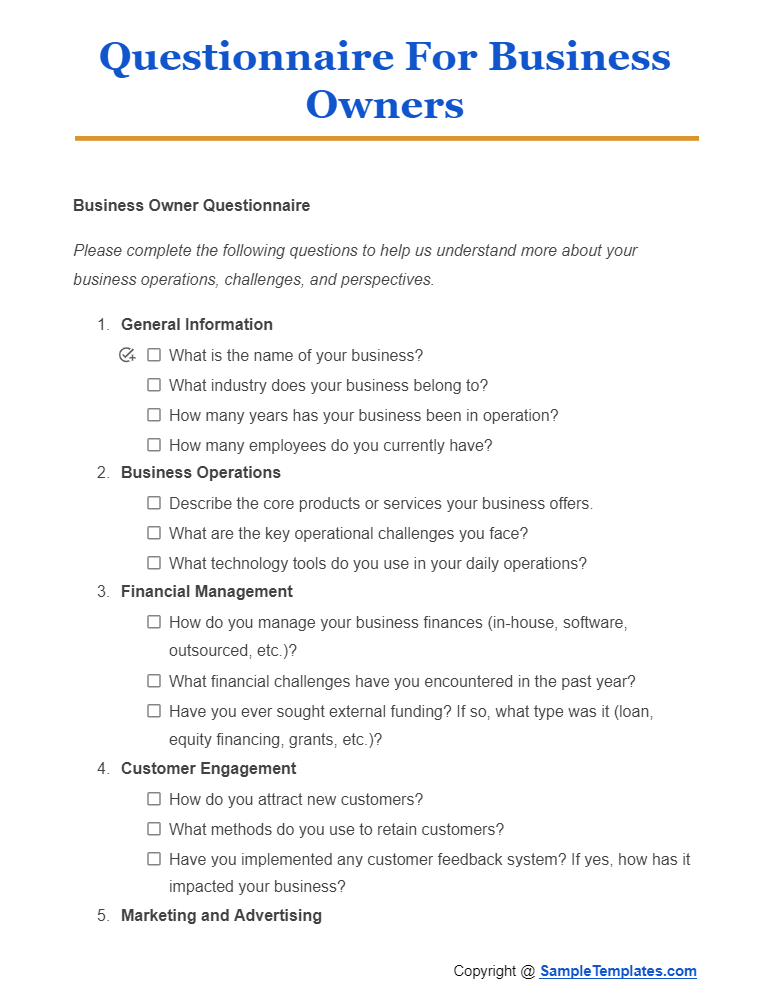
Questionnaire For Project
Project Questionnaire: Consumer Behavior and Sustainable Products
Introduction: Thank you for participating in our survey. Your responses will help us understand consumer preferences and behaviors regarding sustainable products. This questionnaire should take about 5-10 minutes to complete. Please answer all questions as honestly as possible. Your responses will remain confidential.
Part 1: Demographic Information
- Age:
- Under 18
- 18-24
- 25-34
- 35-44
- 45-54
- 55-64
- 65+
- Gender:
- Male
- Female
- Prefer not to say
- Other (please specify): ___________
- Location (City/State): _________________
- Highest level of education completed:
- High school or equivalent
- Some college
- Bachelor’s degree
- Graduate degree
Part 2: Consumer Habits 5. How often do you purchase products labeled as ‘sustainable’ or ‘eco-friendly’?
- Never
- Rarely
- Sometimes
- Often
- Always
- What factors influence your decision to purchase sustainable products? (Select all that apply)
- Price
- Quality
- Brand reputation
- Environmental impact
- Social influence (friends/family)
- Other (please specify): ______________
- Would you be willing to pay a higher price for a product if it is environmentally friendly?
- Yes
- No
- Depends on the product
Part 3: Awareness and Attitudes 8. How knowledgeable do you feel about environmental issues related to consumer products?
- Not knowledgeable
- Somewhat knowledgeable
- Moderately knowledgeable
- Very knowledgeable
- Extremely knowledgeable
- How important is it for you that companies you purchase from are environmentally responsible?
- Not important
- Somewhat important
- Neutral
- Important
- Very important
- What types of sustainable practices do you wish more companies would implement? (Open-ended)
Conclusion: Thank you for your time and insights. Your participation is crucial to our project and helps promote sustainable consumer practices. If you have any other comments or insights, please share them below:
Submit [Submit Button]
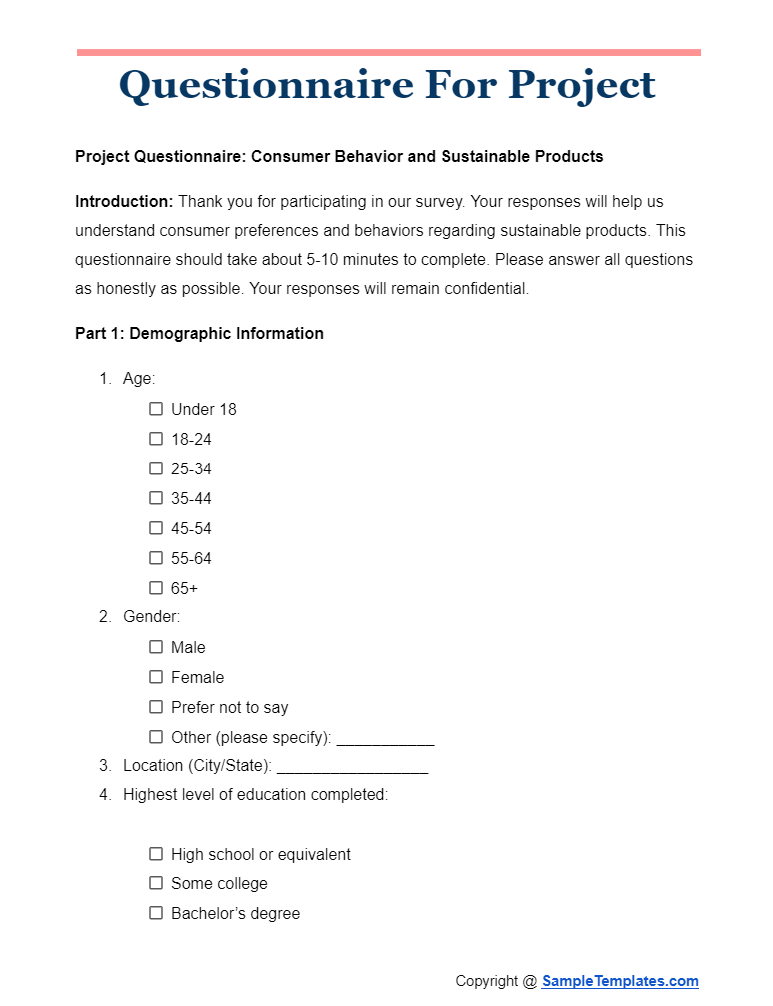
Browse More Templates On Questionnaire
Sample Interview Questionnaire Template
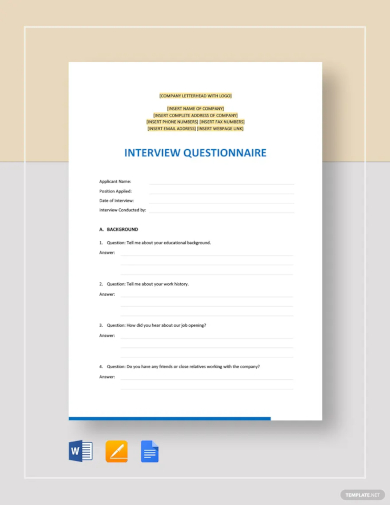
Free Checklist Questionnaire For Hiring a Lawyer Template
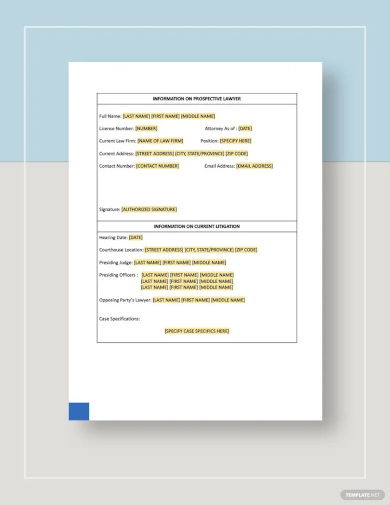
How to Make a Questionnaire
Creating a questionnaire is a practical way to gather information from a specific group of people. It can be used in various contexts, including research, customer feedback, education, and more. Here’s a step-by-step guide on how to make an effective questionnaire:
1. Define Your Objectives
Start by clearly defining what you want to achieve with your questionnaire. What information are you trying to gather? Understanding your objectives will help you formulate relevant questions and decide on the appropriate format.
2. Identify Your Audience
Knowing who will be answering your questions is crucial. Consider the demographics of your target audience, such as their age, education level, and background. This will help in crafting questions that are understandable and appropriate for your audience.
3. Choose the Type of Questions
Decide on the types of questions you want to include:
- Open-ended questions allow respondents to answer in their own words, giving richer details.
- Closed-ended questions provide predefined responses (e.g., yes/no, multiple choice, rating scales), making the data easier to analyze.
4. Write Clear and Concise Questions
Ensure your questions are straightforward and avoid ambiguity:
- Avoid jargon or complex language.
- Keep questions short and to the point.
- Avoid double-barreled questions (asking two things at once).
5. Design the Questionnaire Layout
Structure your questionnaire logically:
- Group similar questions together.
- Start with less personal, easier questions to engage the respondents.
- Place demographic questions at the end unless they are relevant to tailoring subsequent questions.
6. Ensure Questionnaire is Bias-Free
Questions should be neutral and not lead or influence the respondent’s answers. Be mindful of bias which can skew results and reduce the validity of your data.
7. Pilot Your Questionnaire
Test your questionnaire with a small, representative sample of your target audience to identify any confusing questions or technical issues. This testing phase can provide critical insights that allow you to refine the questionnaire before full deployment.
8. Revise and Improve
Based on the feedback from your pilot, make necessary adjustments to the wording, order, and format of questions. This is crucial to ensure that the data collected will be valid and reliable.
9. Distribute the Questionnaire
Choose the most effective method to distribute your questionnaire, which could be online through email or social media, or in person. Consider what is most accessible to your target audience and will likely result in the highest response rate.
10. Collect and Analyze Data
After distribution, monitor responses and prepare to analyze the data according to your predefined objectives. Software tools like Google Forms, SurveyMonkey, or statistical software can facilitate data analysis, especially with large sample sizes.
11. Report Your Findings
Once data analysis is complete, prepare a report that summarizes the findings, provides insights based on the data, and, if applicable, offers recommendations based on the objectives of your research.
By following these steps, you can create a questionnaire that effectively gathers the necessary data while being respectful and considerate of the time and effort of those responding.
Couples Questionnaire Template
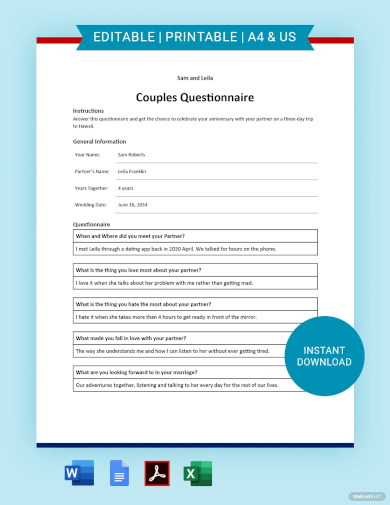
Free Basic Survey Questionnaire Template
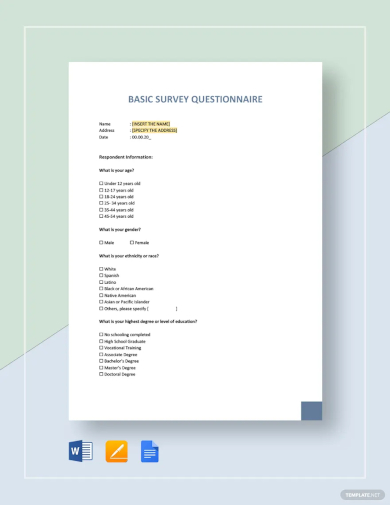
Job Interview Questionnaire Template
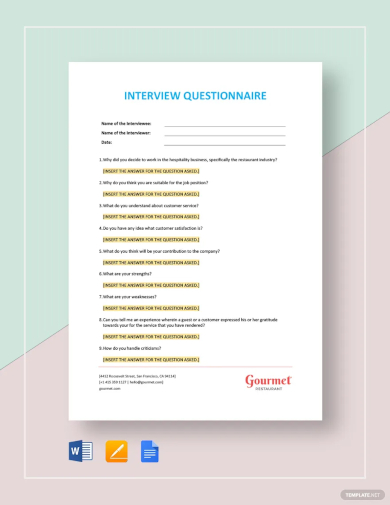
Sample Wedding Questionnaire Template
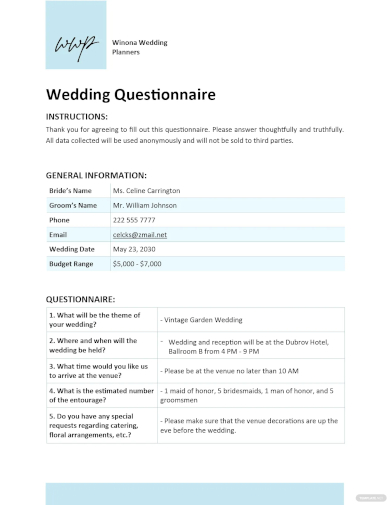
Business Branding Questionnaire
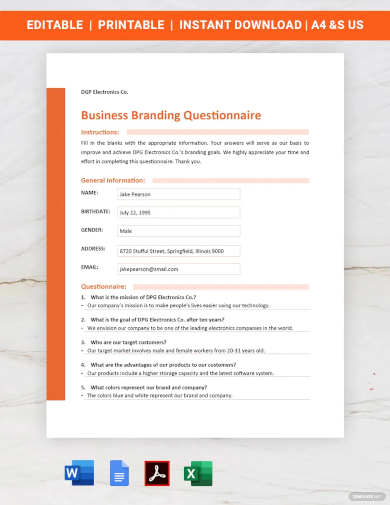
Trade Show Exhibit Questionnaire Template
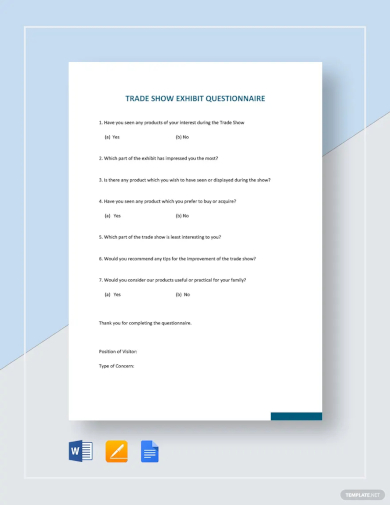
Wedding Planner Client Questionnaire
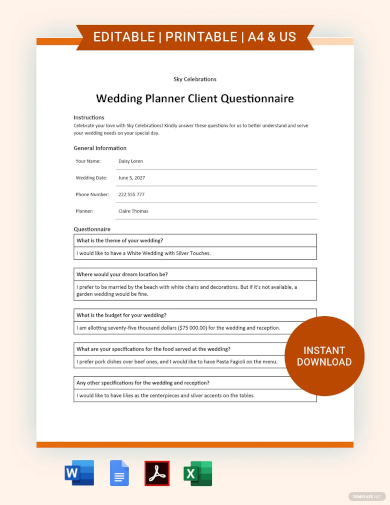
Sample Teacher Questionnaire Template
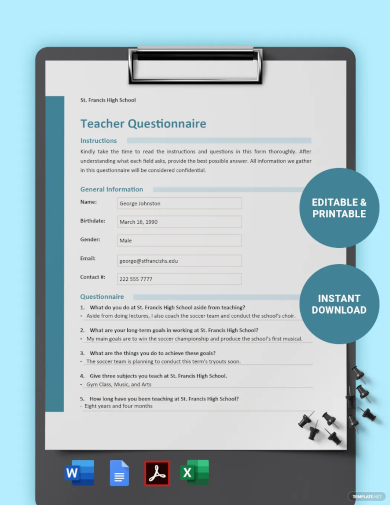
Survey Questionnaire for Food Business Template
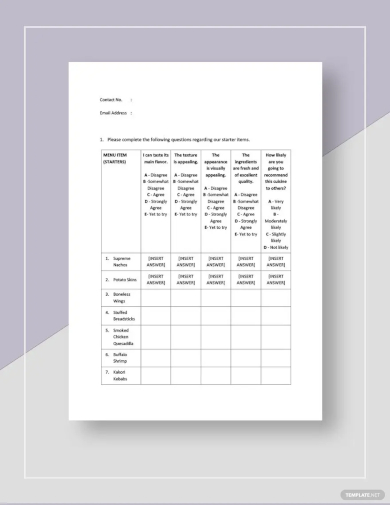
Residential Interior Design Client Questionnaire
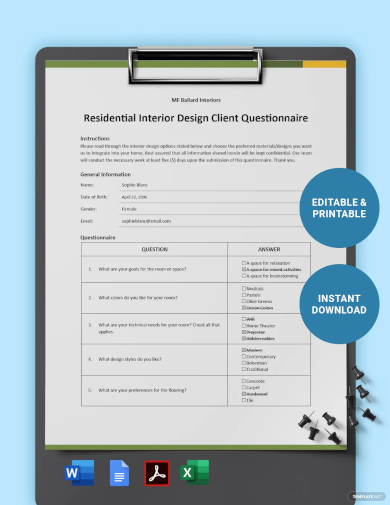
Benefits of Questionnaire
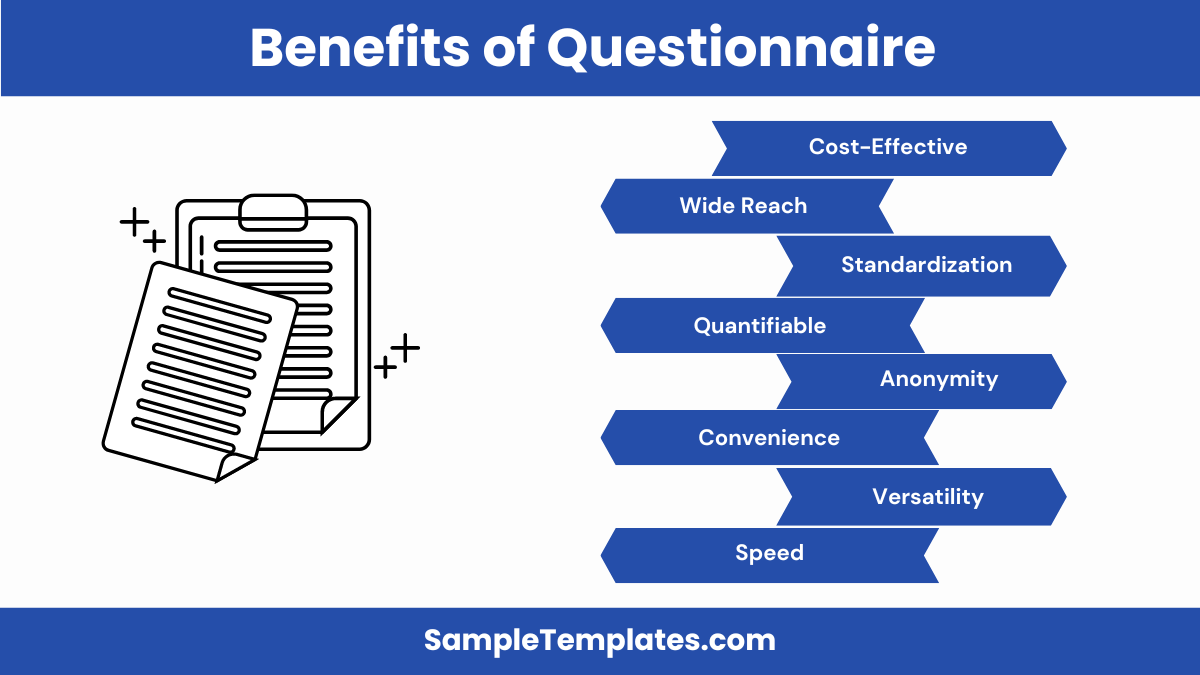
Questionnaires are a widely used tool in research, marketing, education, and many other fields due to their ability to gather data efficiently and effectively. Here are some key benefits of using questionnaires:
- Cost-Effective: Compared to other data collection methods, such as face-to-face interviews or field studies, questionnaires are relatively inexpensive, especially when distributed and collected electronically.
- Wide Reach: Questionnaires can be distributed to a large number of people across different geographical locations simultaneously, allowing for a broad and diverse sample. This is particularly advantageous when conducting large-scale studies or seeking input from wide-ranging demographics.
- Standardization: All respondents receive the same set of questions, which helps in maintaining consistency in the data collected. This standardization ensures that differences in responses are due to the respondents’ views and experiences, not because of differences in question interpretation.
- Quantifiable: The structured format of most questionnaires, especially those with closed-ended questions, allows for easy quantification of data. This facilitates straightforward data analysis, including statistical analysis, which can provide robust insights into trends, patterns, and correlations.
- Anonymity: Respondents can often complete questionnaires anonymously, which can increase the likelihood of obtaining honest and accurate responses, especially on sensitive or personal issues.
- Convenience: Participants can complete questionnaires at their convenience, which can lead to higher response rates. Electronic and online questionnaires can be particularly convenient for both researchers and participants, as they can be accessed from different devices and at any time.
- Versatility: Questionnaires can be used to collect a wide range of data types, from simple demographic information to opinions and deeply personal beliefs. This makes them suitable for various research purposes in different disciplines.
- Speed: Data collection via questionnaires is typically quicker than other methods. Once the questionnaire is designed and distributed, data can start coming in almost immediately and can be analyzed quickly, especially if the questionnaire is administered online.
- Less Bias: The absence of the researcher during the actual completion of a questionnaire can reduce potential bias introduced by the interviewer’s presence or behavior. This can lead to more objective data collection.
- Accessibility: With advancements in technology, electronic questionnaires can be made accessible to people with disabilities, such as those requiring screen readers, enhancing inclusivity in research and data collection.
Utilizing questionnaires effectively can lead to significant insights and data that support decision-making, sample policy formulation, academic research, and business strategies, among other applications.
Free Apology for Poor Service Rating On Customer Questionnaire Template
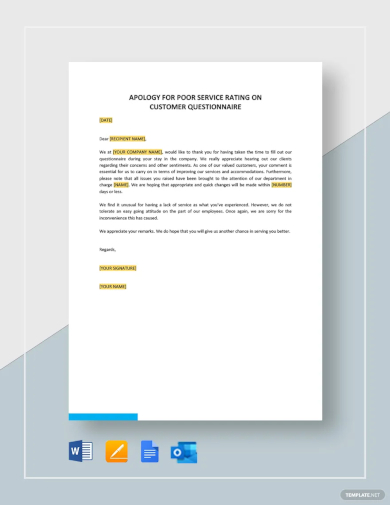
Client Exit Questionnaire
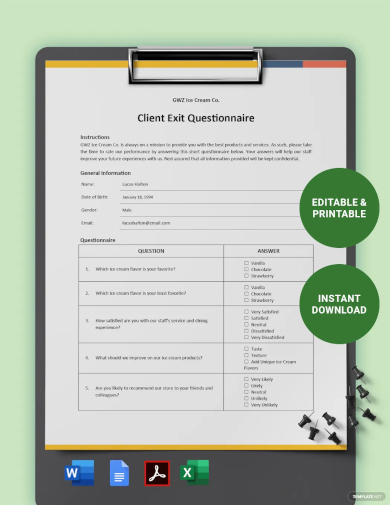
Likert Scale Questionnaire Template
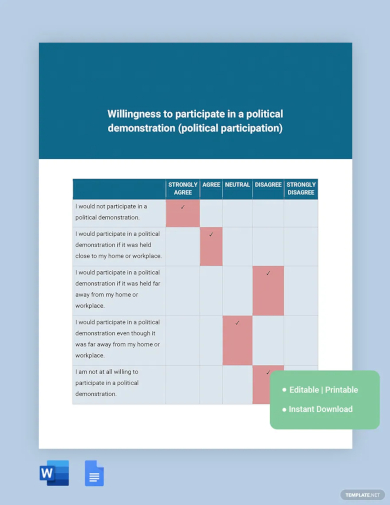
Tenant-Lease Questionnaire Template
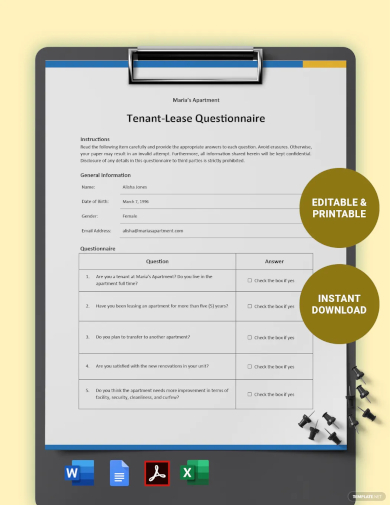
High School Questionnaire Template
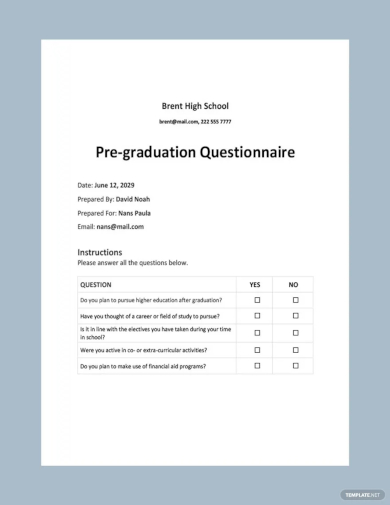
Grandparents Questionnaire
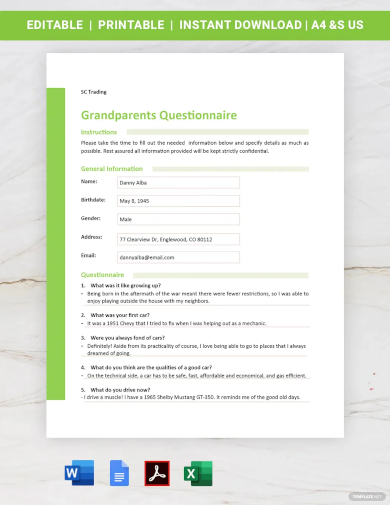
Buyer Questionnaire Template
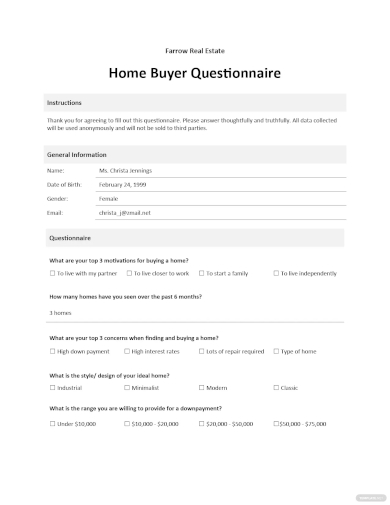
Basic Survey Questionnaire Template
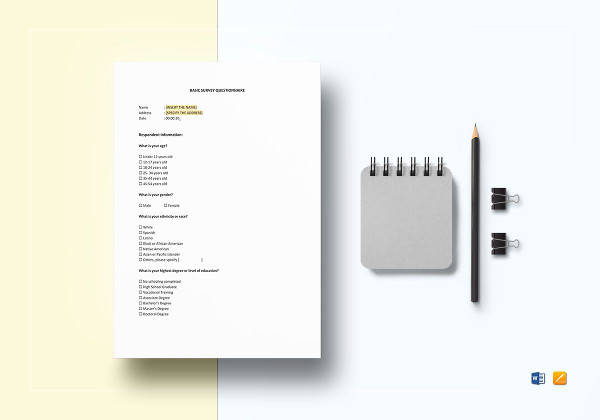
Interview Questionnaire Template
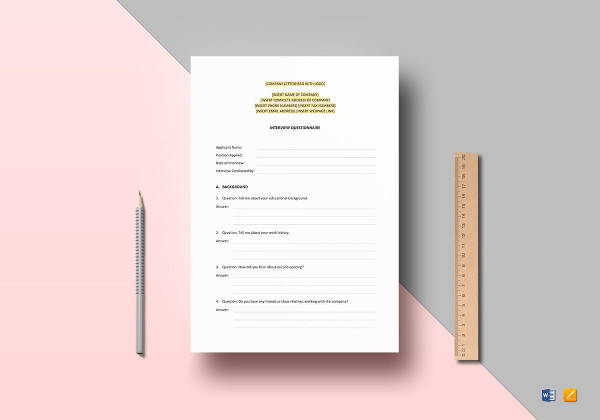
Student Questionnaire Template
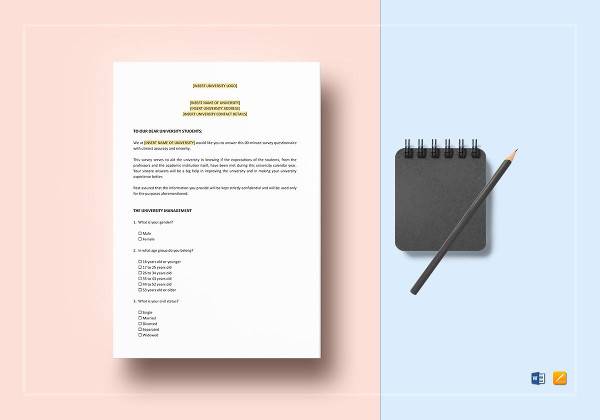
What is Mail Questionnaire?
A mail questionnaire is a process of sending questionnaire sheets to a targeted audience via email. Agencies, government, and other companies attach questionnaire document sheets to the email and ask subscribers and customers to fill it and send again. This type of questionnaire has lower response rate as compared to other types. To achieve higher rates, you need to remind the audience again and again for taking actions.You may also see employee engagement survey templates
Customer Questionnaire Template
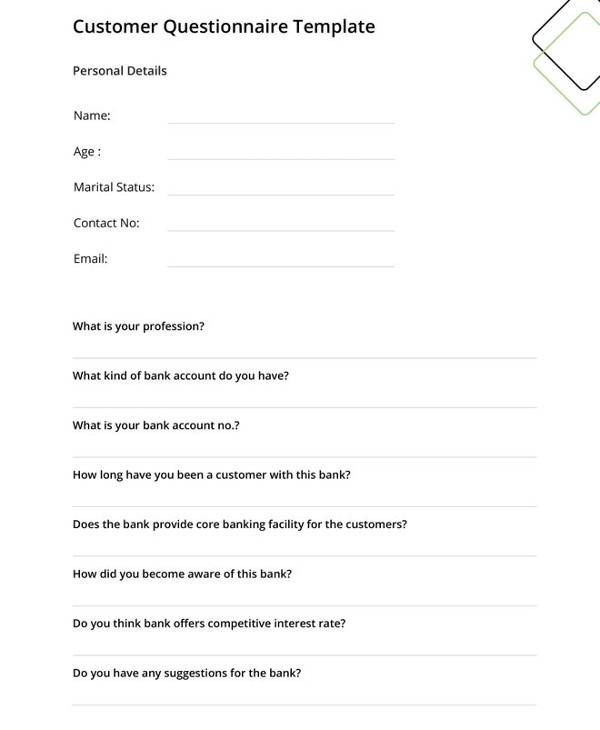
Market Research Questionnaire Template
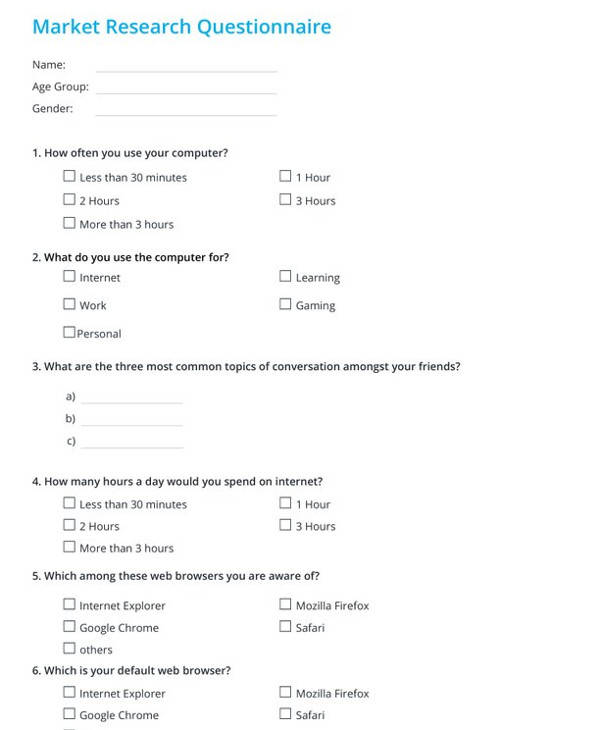
Sample School Questionnaire Template

Sample Audit Questionnaire Template
Download the document and explore each and every question available in the sample audit questionnaire. Do prepare a custom audit questionnaire document. You may also see training needs assessment templates
Audit Committee Self Assessment Questionnaire Template
Basic Audit C Questionnaire Template
Sample Assessment Questionnaire Template
This assessment questionnaire PDF is a JavaScript enabled document. Parents can use this document for their kid’s assessment. Also, health agencies can plan custom assessment questionnaires for data collection.You may also see book reports.
Stress Assessment Questionnaire Template
Health Assessment Questionnaire Template
Sample Appraisal Questionnaire Template
This sample appraisal questionnaire is a blank supplier appraisal questionnaire PDF. Either print it for personal use or prepare a custom document using the similar format.You may also see performance reviews.
Performance Appraisal Questionnaire Template
Formal Health Appraisal Questionnaire Template
Sample Marketing Questionnaire Template
Download the document, check marketing questionnaire example, and prepare your custom questionnaire template to gather client’s requirements.You may also see retreat evaluation sample forms
Email Marketing Questionnaire Template
Market Research Questionnaire Template
Printable Business Questionnaire Template
If you are seeking for a business questionnaire sample, then this document is the best professional sample questionnaire available for you. Do analyze this sample business document and get the idea of drafting a custom questionnaire.You may also see leadership self assessment
Business Plan Questionnaire Template
Annual Business Survey Questionnaire Template
Printable Checklist Questionnaire Template
This document will help you in preparing custom checklist questionnaire form. Get help in purpose analysis, audience analysis, questions selection, checklist build up, etc.You may also see needs assessment samples
Checklist Planning Questionnaire Template
Questionnaire for Data Checklist Template
Sample Client Questionnaire Template
Clients are valuable entities for any business organization, and they wish to build long relations by delivering quality services. Download this sample document and get an idea for preparing custom client questionnaire to offer better services.You may also see survey forms in excel
Web Design Client Questionnaire Template
How to Create a Questionnaire?
Creating a questionnaire involves careful sample planning and design to ensure it effectively captures the information you need. Here’s a concise guide on how to develop a questionnaire:
1. Define Your Objectives
Start by defining what you want to achieve with the questionnaire. Clearly articulate the goals and what specific information you need. This will help guide the structure and content of your questionnaire.
2. Identify Your Audience
Understand who will be filling out the questionnaire. Knowing your audience allows you to tailor the language, question complexity, and format to suit their characteristics and needs.
3. Choose the Type of Questions
Decide on the types of questions that will best capture the information you need:
- Open-ended questions provide qualitative insights and allow respondents to answer in their own words.
- Closed-ended questions offer predefined responses (e.g., yes/no, multiple choice, Likert scales) and are easier to analyze quantitatively.
4. Write Clear and Concise Questions
Craft questions that are simple, straightforward, and free from bias:
- Avoid complex vocabulary or jargon unless it is appropriate for your audience.
- Ensure each question is focused on a single idea to avoid confusion.
- Avoid leading or loaded questions that might sway the respondent’s answer.
5. Organize the Questionnaire
Structure your questionnaire logically:
- Start with easy and non-intrusive questions to engage respondents.
- Group related questions to keep the questionnaire coherent.
- Save demographic questions for the end unless they are necessary for screening early in the survey.
6. Pilot Test Your Questionnaire
Before full deployment, test your questionnaire with a small segment of your target audience. This helps identify any ambiguous or confusing questions and allows you to gauge the average completion time.
7. Revise as Necessary
Based on the feedback from your pilot test, make necessary adjustments to the wording, order, or format of the questions.
8. Consider the Administration Method
Decide how you will distribute the questionnaire (online, paper, face-to-face, etc.). The method can affect respondents’ willingness and ability to complete the questionnaire, as well as the cost and ease of data collection.
9. Implement and Monitor
Distribute your questionnaire and monitor the responses. Ensure that data is being collected as expected and check for any issues that might arise during the collection phase.
10. Analyze and Report
After data collection, analyze the results based on your initial objectives. Prepare a report or presentation to share the findings with stakeholders or use them to inform decisions.
By following these steps, you can create a questionnaire that effectively gathers the data you need while respecting the time and perspective of your respondents.
Public Defender Client Questionnaire Template
Sample Divorce Questionnaire Template
This document is a boon to divorce lawyers. Download the document, print it, and ask clients to answer the questionnaire. It enables you to gather client’s personal, professional, physical, and mental details for brief analysis.You may also see 360-degree feedback forms
Intake Divorce Questionnaire
Confidential Divorce Questionnaire Template
Sample Education Questionnaire Template
Before conducting an education questionnaire, you should download this document and read the sample education questionnaire. It will help you in goal identification and sum up all possible questions that can strengthen your campaign.You may also see health history templates.
Student Education Questionnaire
Teacher Education Questionnaire Template
Sample Evaluation Questionnaire
If you are conducting a workshop and need blank sample workshop evaluation questionnaire template, then do download this document and print it. Ask students/participants to rate the workshop on various grounds and analyze the collected data.
Post-Training Evaluation Questionnaire Template
Job Evaluation Questionnaire Template
Sample Event Questionnaire
This document will help you in preparing a custom event questionnaire. Also, you print the sample document and use it to gather guest’s feedback regarding the event and event planning.You may also see satisfaction survey samples
Event Planning Questionnaire Template
Event Feedback Questionnaire Template
Sample Employer Questionnaire Template
Both individual trainers and business can use this sample employer questionnaire template to gather participant’s feedbacks regarding the training program. It contains a list of multiple questions that helps in a better analysis.You may also see event feedback forms.
Employer Survey Questionnaire
Pre-Employment Health Questionnaire Template
Sample Feedback Questionnaire Template
This sample document is a helpful resource to trainers, institutes, and employers. You can print the template and distribute it among participants for feedback collection. It contains multiple questions for deep analysis.You may also see health risk assessments
Customer Feedback Questionnaire
Patient Feedback Questionnaire Template
Sample Dietary Diversity Questionnaire Template
Sample dietary diversity is a professionally structured sample document. It can be used by dieticians, medical professionals, and health experts for client’s diet analysis and making changes as needed.You may also see blank survey templates.
Household Dietary Diversity Questionnaire
Dietary Diversity Score Questionnaire Template
Sample Property Questionnaire Template
Before conducting a property questionnaire, you should refer this document for better analysis. Get the basic idea, identify your objective, survey purpose and ten prepare a unique questionnaire for a deep insight.You may also see business impact analysis samples
Sellers Property Questionnaire
Property Management Questionnaire Template
Sample Health Questionnaire
This document is helpful to doctors, physicians, and other medical professionals. The template is free to download. Print the PDF and ask patients to complete the survey for health analysis.You may also see retreat evaluation forms
Mental Health Questionnaire Template
Patient Health Questionnaire Template
Sample Interview Questionnaire Example
This document is helpful to both applicants and employers. It contains a list of common questions asked during interviews. Also, it contains tips for employers to analyze interviewee’s behavior.You may also see employee engagement survey templates
Candidate Pre- Interview Questionnaire Template
Exit Interview Questionnaire Template
Sample Induction Questionnaire Template
If you require Occupational health and safety questionnaire sample, then this document is available for free to download. Use it for official purpose or prepare a unique one for adding extra questions.You may also see Client satisfaction survey samples
Induction Feedback Questionnaire
Contractor Induction Questionnaire Template
Sample Pre-Training Questionnaire
This document contains pre-training questionnaire sample template. Do print this document, conduct an assessment program and ask participants to rate themselves on various grounds before and after the training program.You may also see EEOC complaint forms
Pre-Training Course Questionnaire Template
Pre Training Questionnaire Overview
Assessment Experience Questionnaire Template
This document contains a basic assessment questionnaire sample. Students can use it for self-analysis. Also, you can prepare custom rating-surveys using the reference.You may also see church survey templates.
Student Assessment Experience Questionnaire Template
Assessment Experience Evaluation Questionnaire
Sample Screening Questionnaire
If you need a sample document to analyze screening questionnaire format, then download this document for reference. This sample can be used by any industry for planning custom questionnaire. You may also see health survey templates.
Alcohol Screening Questionnaire Template
Trauma Screening Questionnaire Template
Market Survey Questionnaire Outline
This document is an effective sample survey questionnaire. Do check the necessary questions list and add it to your custom surveys. Also, you can make customization in the document using MS-word.
Consumer Market Survey Questionnaire Template
Types of Questionnaire
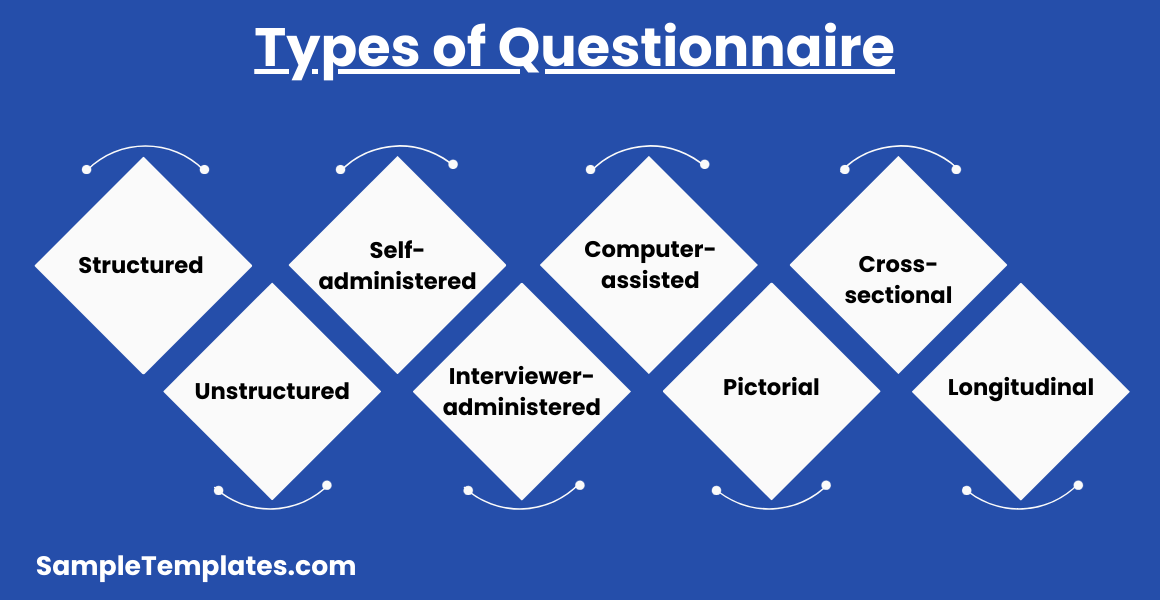
Questionnaires can be categorized into various types based on their format, method of delivery, and the nature of the questions they include. Understanding these different types can help in designing a questionnaire that best fits the specific needs of your research or survey goals. Here are some common types of questionnaires:
1. Structured Questionnaires
Structured questionnaires have a fixed format with a set of predefined questions. The responses are also typically structured, often including:
- Closed-ended questions: These require respondents to choose from given options, such as multiple-choice questions, dichotomous (yes/no), Likert scales, or ranking scales.
2. Unstructured Questionnaires
These questionnaires are more open-ended and allow respondents to answer in their own words, providing more detailed and qualitative data. They are useful when exploring new topics where potential responses are unknown.
3. Semi-structured Questionnaires
A hybrid of structured and unstructured types, these questionnaires include both open-ended and closed-ended questions. This format allows researchers to collect both quantitative data for statistical analysis and qualitative data for deeper insights.
4. Self-administered Questionnaires
These are completed by the respondents themselves, without any interviewer present. They can be distributed via mail, email, or online platforms. This type often requires clear and straightforward questions to avoid misunderstandings since there is no interviewer to clarify ambiguities.
5. Interviewer-administered Questionnaires
In this type, an interviewer presents the questions orally and records responses. This method can be beneficial for dealing with more complex or sensitive issues where respondent comprehension might be a concern, or where additional explanation is needed.
6. Computer-assisted Questionnaires
These can be administered through various digital formats:
- CAWI (Computer-Assisted Web Interviewing): The questionnaire is completed by the respondent via an online survey.
- CATI (Computer-Assisted Telephone Interviewing): The interviewer uses a computer to guide the interview and record responses during a phone call.
7. Pictorial Questionnaires
Used primarily in surveys targeting populations with low literacy levels or children, these questionnaires use pictures to represent questions or answer options. This helps to overcome language barriers and makes the questionnaire more engaging.
8. Cross-sectional Questionnaires
These are administered to respondents at a single point in time. They are typically used to gather data on the current status of the respondents with regard to the survey topic.
9. Longitudinal Questionnaires
Conducted over a period of time, these questionnaires track changes in respondent behavior or attitudes. They can be complex to administer but are valuable for observing trends and patterns over time.
Each type of questionnaire serves different research purposes and contexts, making it crucial to choose the type that aligns best with the objectives and constraints of your project.
Market Survey Staff Questionnaire Template
Sample Work Activity Questionnaire Template
Business, organizations and other communities can use this document to gather work activity records of their employees. It helps them in better decision making like conducting a training program, employee termination, planning retirements, etc.You may also see travel survey templates.
Work Activity Questionnaire Form Template
Generalized Work Activity Questionnaire
What is Contingency Question?
Contingency question is a type of question that is asked when the respondent has given a particular reply to a previous question. Let, if you are asked to answer the question, “Do you drink milk?” You will answer it either yes or no. If you give “yes” as a reply, then you will be asked next question like, “do you drink milk daily?” etc.You may also see parent survey templates.
Our sample documents are available in PDF file format. Also, you will get high-quality printouts using both laser and inkjet printers. You will get user-friendly view via all media devices including desktop, mobile, and tablets.You may also see health history templates.
If you have any DMCA issues on this post, please contact us.
Related Posts
Sample Business Card Templates
Sample Cashier Job Descriptions
FREE 10+ Sample HR Resource Templates in PDF
FREE 10+ HR Consulting Business Plan Samples in MS Word | Google Docs | Pages | PDF
FREE 49+ Sample Job Descriptions in PDF | MS Word
FREE 16+ Nonprofit Budget Samples in PDF | MS Word | Excel | Google Docs | Google Sheets | Numbers | Pages
FREE 13+ Academic Calendar Templates in Google Docs | MS Word | Pages | PDF
FREE 10+ How to Create an Executive Summary Samples in Google Docs | MS Word | Pages | PDF
FREE 23+ Sample Event Calendar Templates in PDF | MS Word | Google Docs | Apple Pages
Company Profile Samples
FREE 10+ Leadership Report Samples [ Development, Training, Camp ]
FREE 24+ Sample Payment Schedules in PDF | MS Word
FREE 10+ Return to Work Action Plan Samples in PDF | DOC
Autobiography Samples & Templates
Service Quote Samples & Templates

